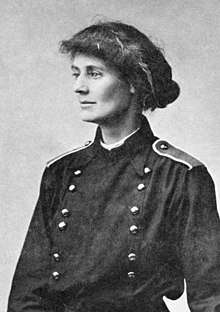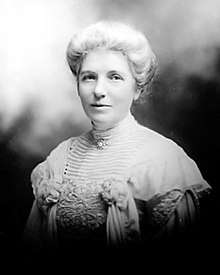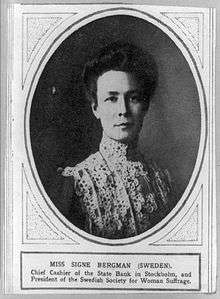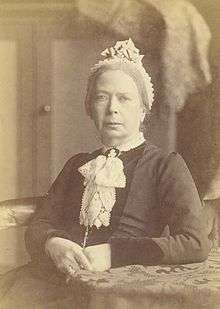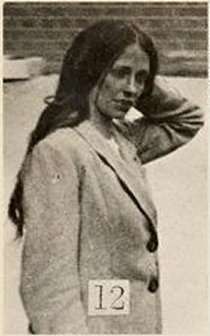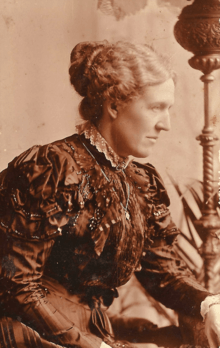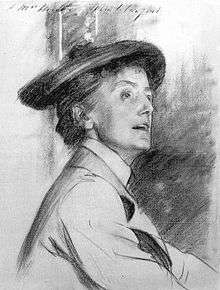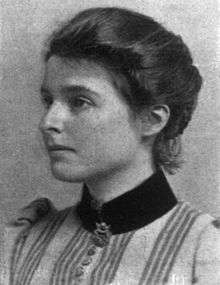List of suffragists and suffragettes
This list of suffragists and suffragettes includes noted individuals active in the worldwide women's suffrage movement who have campaigned or strongly advocated for women's suffrage, the organisations which they formed or joined, and the publications which publicized – and, in some nations, continue to publicize – their goals. Suffragists and suffragettes, often members of different groups and societies, used or use differing tactics. "Suffragette" in the British usage denotes a more "militant" type of campaigner, while suffragettes in the United States organized such nonviolent events as the Suffrage Hikes, the Woman Suffrage Procession of 1913, and the Silent Sentinels.
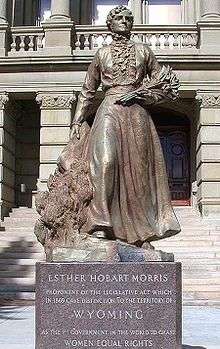
.jpg)
Argentina
- Cecilia Grierson (1859–1934), the first woman physician in Argentina; supporter of women's emancipation, including suffrage
- Julieta Lanteri (1873–1932) – physician, freethinker, and activist; the first woman to vote in Argentina
- Alicia Moreau de Justo (1885–1986) – physician, politician, pacifist and human rights activist
- Eva Perón (1919–1952) – First Lady of Argentina, created the first large female political party in the nation
- Elvira Rawson de Dellepiane (1867–1954) – physician, activist for women's and children's rights; co-founder of the Association Pro-Derechos de la Mujer
Australia
- Maybanke Anderson (1845–1927) – promoter of women's and children's rights, campaigner for women's suffrage and federation
- Eliza Ashton (1851/1852 – 15 July 1900) journalist and founding member of the Womanhood Suffrage League of New South Wales
- Annette Bear-Crawford (1853–1899), women's suffragist and federationist in Victoria
- Rosetta Jane Birks (1856–1911) – social reformer, philanthropist and South Australian women's suffragist
- Dora Meeson Coates (1869–1955) – artist, member of British Artists' Suffrage League
- Mary Colton (1822–1898) – president of the Women's Suffrage League from 1892 to 1895
- Edith Cowan (1861–1932) – politician, social campaigner, first woman elected to an Australian parliament
- Henrietta Dugdale (1827–1918) – initiated the first female suffrage society in Australia
- Kate Dwyer (1861–1949) – schoolteacher and Labor leader, member of the Womanhood Suffrage League of New South Wales
- Fanny Furner (1864–1938) – activist, first women to stand for election in local government in Manly
- Belle Theresa Golding (1864–1940) – feminist, suffragist and labor activist
- Vida Goldstein (1869–1949) – feminist politician, first woman in British Empire to stand for election to a national parliament
- Serena Lake – South Australian evangelical preacher, social reformer, campaigner for women's suffrage
- Louisa Lawson (1848–1920) – poet, writer, publisher, and feminist
- Mary Lee (1821–1909) – suffragist and social reformer in South Australia
- Muriel Matters (1877–1969) – lecturer, journalist, educator, actress, elocutionist, member of the Women's Freedom League
- May Jordan McConnel (1860–1929) – trade unionist and suffragist, member of the Women's Equal Franchise Association
- Emma Miller (1839–1917) – pioneer trade union organiser, co-founder of the Women's Equal Franchise Association
- Elizabeth Webb Nicholls (1850–1943) – campaigner for women's suffrage in South Australia
- Jessie Rooke (1845–1906) – Tasmanian suffragist and temperance reformer
- Rose Scott (1847–1925) – founder of the Women's Political Education League
- Catherine Helen Spence (1825–1910) – author, teacher, and journalist; commemorated on a special issue of the Australian five-dollar note
- Jessie Street (1889–1970) – feminist, human rights campaigner
- Mary Hynes Swanton (22 June 1861 – 25 November 1940) Australian women's rights and trade unionist
- Mary Windeyer (1836–1912) – women's suffrage campaigner in New South Wales
Austria
- Marianne Hainisch (1839–1936) – founder and leader of the Austrian women's movement, mother of first President of Austria
- Ernestine von Fürth, (1877–1946) – co-founder of the New Viennese Women's Club, chairwoman of the Austrian Women's Suffrage Committee
- Friederike Mekler von Traunweis Zeileis (née Mautner von Markhof, 1872–1954) founding member of the IWSA
- Rosa Welt-Straus (1856–1938) – first Austrian woman to earn a medical degree; representative to the International Woman Suffrage Alliance
Belgium
- Jane Brigode (1870–1952) – politician, member of the International Woman Suffrage Alliance
- Léonie de Waha (1836–1926) – Belgian feminist, philanthropist, educator and Walloon activist
- Isabelle Gatti de Gamond (1839–1905) – Belgian educator, feminist, suffragist and politician
- Marie Parent (1853–1934) – journal editor, temperance activist, feminist and suffragist
- Marie Popelin (1846–1913) – lawyer and early feminist political campaigner; worked for universal adult suffrage
- Louise van den Plas (1877–1968) – suffragist and founder of the first Christian feminist movement in Belgium.
Brazil
- Leolinda de Figueiredo Daltro (1859–1935) – teacher and indigenous' rights activist; co-founder of the Feminine Republican Party
- Celina Guimarães Viana (1890–1972) – Brazilian professor and suffragist; first woman to vote in Brazil
- Ivone Guimarães (1908–1999) – Brazilian professor and activist for women's suffrage
- Jerônima Mesquita (1880–1972) – co-founder of the Federação Brasileira pelo Progresso Feminino
- Carlota Pereira de Queirós (1892–1982) – the first woman to vote and be elected to the Brazilian parliament
- Marie Rennotte (1852–1942) – Native Belgian, naturalized Brazilian teacher and lawyer who founded the Aliança Paulista pelo Sufrágio Feminino with Carrie Chapman Catt's help.
- Miêtta Santiago (1903–1995) – Brazilian writer, poet, and lawyer; challenged the constitutionality of the ban on women voting in Brazil
- Maria Werneck de Castro (1909–1993) – lawyer, militant communist, feminist, and supporter of women's suffrage
Bahamas
- Mary Ingraham (1901–1982) – co-founder and president of the Bahamas Women's Suffrage Movement
- Georgianna Kathleen Symonette (1902–1965) – co-founder of the Women's Suffrage Movement
- Mabel Walker (suffragist) (1902–1987) – co-founder of the Women's Suffrage Movement
Bulgaria
- Zheni Bozhilova-Pateva (1878–1955) teacher, writer, and one of the most active women's rights activists of her era
- Dimitrana Ivanova (1881–1960) – reform pedagogue, women's rights activist
- Julia Malinova (1869–1953) – women's rights activist
Canada
- Edith Archibald (1854–1936) – writer who led the Maritime Women's Christian Temperance Union and the National Council of Women of Canada and the Local Council of Women of Halifax
- Francis Marion Beynon (1884–1951) – Canadian journalist, feminist and pacifist
- Laura Borden (1861–1940) – wife of Sir Robert Laird Borden, the eighth Prime Minister of Canada
- Henrietta Muir Edwards (1849–1931) – women's rights activist and reformer
- Helena Gutteridge (1879–1960) – first woman elected to city council in Vancouver
- Gertrude Harding (1889–1977) – one of the highest-ranking and longest-lasting members of the Women's Social and Political Union
- Anna Leonowens (1831–1915) – travel writer, educator and social activist
- Nellie McClung (1873–1951) – politician, author, social activist, member of The Famous Five
- Louise McKinney (1868–1931) – politician, women's rights activist, Alberta legislature
- Emily Murphy (1868–1933) – women's rights activist, jurist, author
- Irene Parlby (1868–1965) – women's farm leader, activist, politician
- Eliza Ritchie (1856–1933) – educator and member of the executive of the Local Council of Women of Halifax
- Octavia Ritchie (1868–1948) physician
- Emily Stowe (1831–1903) – doctor, campaigned for the country's first medical college for women
- Jennie Fowler Willing (1834–1916) – educator, author, preacher, social reformer, suffragist
Chile
- Henrietta Müller (1846–1906) – Chilean-British women's rights activist and theosophist
- Marta Vergara (1898–1995) – co-founder of MEMch; Inter-American Commission of Women delegate
China
- Lin Zongsu (1878–1944) – founder of the first suffrage organization in China
Colombia
- Lucila Rubio de Laverde – co-founder of the suffrage organizations, Unión Femenina de Colombia (Women's Union of Colombia) (UFC) and the Alianza Femenina de Colombia (Women's Alliance of Colombia)
- María Currea Manrique (1890–1985) – co-founder of the suffrage organizations, Unión Femenina de Colombia (Women's Union of Colombia) (UFC) and the Alianza Femenina de Colombia (Women's Alliance of Colombia)
Czech Republic (Czechoslovakia)
- Františka Plamínková (1875–1942) – founded the Committee for Women's Suffrage (Czech: Výbor pro volební právo ženy) in 1905 and served as a vice president of the International Council of Women, as well as the International Woman's Suffrage Alliance.
- Zdeňka Wiedermannová-Motyčkova (1868–1915) founder of the Provincial Organization of Progressive Moravian Women
Denmark
- Nanna Aakjær (1874–1962) - woodcarver, suffragist
- Matilde Bajer (1840–1934) – women's rights activist, suffragist, pacifist
- Jutta Bojsen-Møller (1837–1927) – women's rights activist, suffragist, educator
- Esther Carstensen (1873–1955) – voting rights campaigner, women's rights activist, journal editor
- Helen Clay Pedersen (1862–1950) – British-born Danish women's rights activist and suffragist
- Thora Daugaard (1874–1951) – suffragist, women's rights activist, peace activist, editor
- Charlotte Eilersgaard (1858–1922), novelist, playwright, women's rights activist, suffragist
- Mathilde Fibiger (1830–1872) – feminist writer
- Eline Hansen (1859–1919) – co-founder of Dansk Kvinderaad, later Danske Kvinders Nationalråd (DKN)
- Charlotte Klein (1834–1915), women's rights activist and educator
- Kristiane Konstantin-Hansen – textile artist, feminist, suffragist
- Line Luplau (1823–1891) – co-founder and chairperson of the Danske Kvindeforeningers Valgretsforbund or DKV
- Elna Munch (1871–1945) – co-founder of the Landsforbundet for Kvinders Valgret (National Association for Women's Suffrage) or LKV
- Johanne Münter (1844–1921) – writer, women's rights activist, suffragist
- Nielsine Nielsen (1850–1916), physician, suffragist, feminist, politician
- Louise Nørlund (1854–1919) – co-founder and chairperson of the Danske Kvindeforeningers Valgretsforbund or DKV
- Charlotte Norrie (1855–1940) – nurse, feminist, suffragist, educator
- Johanne Rambusch (1865–1944) – co-founder of the Landsforbundet for Kvinders Valgret (Country Association for Women's Suffrage) or LKV
- Vibeke Salicath (1861–1921) – feminist, suffragist and journalist
- Caroline Testman (1839–1919) – co-founder and chairman of the Dansk Kvindesamfund
- Ingeborg Tolderlund (1848–1935) – women's rights advocate and suffragist active in Thisted
- Clara Tybjerg (1864–1941) – feminist, suffragist, peace activist, educator
Egypt
- Doria Shafik (1908–1975) – feminist, poet and editor
- Huda Sha'arawi (1879–1947) – feminist, activist, nationalist, revolutionary, founder of the Egyptian Feminist Union.
El Salvador
- María Álvarez de Guillén (1889–1980) – novelist and inaugural member of the Inter-American Commission of Women.
- Rosa Amelia Guzmán – one of the first 3 women to gain a seat in the Legislative Assembly of El Salvador.
Finland
- Maikki Friberg (1861–1927) – educator, journal editor, suffragist and peace activist
- Alexandra Gripenberg (1857–1913) – writer, newspaper publisher, suffragist, women's rights activist
- Lucina Hagman (1953–1946) – feminist, suffragist, early politician
- Hilda Käkikoski (1864–1912) – women's activist, suffragist, writer, schoolteacher, early politician
- Olga Oinola (1865–1949) President of the Finnish Women Association.
France
- Marie-Rose Astié de Valsayre (1846–1939) – feminist, suffragist, established the Ligue de l'Affranchissement des femmes in 1889
- Hubertine Auclert (1848–1914) – feminist, campaigner
- Olympe Audouard (1832–1890) – feminist, women's rights activist, suffragist
- Marthe Bray (1884–1949) feminist, suffragist
- Cécile Brunschvicg (1877–1946) – feminist politician, secretary-general of the French Union for Women's Suffrage
- Maria Deraismes (1828–1894) – author, major pioneering force for women's rights
- Jeanne Deroin (1805–1894) – socialist feminist
- Marguerite Durand (1864–1936) – stage actress, journalist, founder of her own newspaper
- Blanche Edwards-Pilliet (1858–1941) – physician, activist, suffragist
- Nicole Girard-Mangin (1878–1919) – army physician, suffragist
- Olympe de Gouges (1748–1793) – playwright and political activist
- Caroline Kauffmann (1840–1926) – feminist, women's rights activist, suffragette
- Germaine Malaterre-Sellier (1889–1967) – nurse, suffragist and pacifist
- Louise Michel (1830–1905) – anarchist, school teacher, medical worker
- Héra Mirtel (1868–1931) – writer, feminist, salonnier, suffragist
- Jane Misme (1865–1935) – journalist, feminist, suffragist
- Jeanne Oddo-Deflou (1846–1915) – translator, educator, feminist and suffragist, founder of Groupe français d'Etudes féministes in 1891
- Madeleine Pelletier (1874–1939) – physician, psychiatrist, socialist activist
- Maria Pognon (1844–1925) – writer, feminist, suffragist and pacifist
- Léonie Rouzade (1839–1916) – feminist, suffragist, writer and socialist politician
- Maria Vérone (1874–1939) – feminist, suffragist, women's rights activist
- Louise Weiss (1893–1983) – writer, feminist, politician, suffragist
- Marguerite de Witt-Schlumberger (1853–1924) – proponent of pronatalism and alcoholic abstinence, president of the French Union for Women's Suffrage
Georgia
- Ekaterine Gabashvili (1861–1938)), writer, feminist and suffragist
- Babilina Khositashvili (1884–1973), poet, labour rights activist and suffragist
- Nino Tkeshelashvili (1874–1956) – feminist, suffragist, writer
Germany

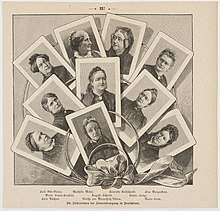
- Jenny Apolant (1874–1925) – Jewish feminist, suffragist
- Anita Augspurg (1857–1943) — jurist, actress, writer, pacifist, suffragist
- Luise Büchner (1821–1877) — writer, women's rights activist
- Marie Calm (1832–1887) – educator, writer
- Minna Cauer (1841–1922) – educator, journalist, women's rights proponent, suffragist
- Adela Coit (1863–1932) — suffragist
- Hedwig Dohm (1831–1919) – feminist, writer, pacifist
- Henriette Goldschmidt (1825–1920) – feminist, social worker
- Lida Gustava Heymann (1868–1943) – women's rights activist, suffragist
- Marie Loeper-Housselle (1837–1916) – educator
- Luise Koch (1860–1934) – educator, women's rights activist, suffragist, politician
- Helene Lange (1848–1930) – educator, pioneering women's rights activist, suffragist
- Bertha von Marenholtz-Bülow – educator
- Lina Morgenstern (1830–1909) – educator, women's rights activist
- Louise Otto-Peters (1819–1895) – suffragist, women's rights activist, writer
- Auguste Schmidt (1833–1902) – educator, women's rights activist
- Marie Stritt (1855–1928) – women's rights activist, suffragist, leading member of the International Woman Suffrage Alliance
- Mathilde Weber (1829–1901) – social worker
- Clara Zetkin (1857–1933) – Marxist theorist, women's rights activist, suffragist, politician
Greece
- Kalliroi Parren (1861–1940) – founder of the Greek women's movement
- Avra Theodoropoulou (1880–1963) – music critic, pianist, suffragist, women's rights activist, nurse
Haiti
- Yvonne Sylvain (1907–1989) – first female doctor from Haiti and advocate for gender equality
Honduras
- Graciela Bográn (1896–2000) – educator, writer, women's rights activist
Hungary
- Vilma Glücklich (1872–1927) – educator, pacifist, suffragist, feminist
- Rosika Schwimmer (1877–1948) – pacifist, feminist and suffragist
- Adele Zay (1848–1928) – Transylvanian teacher, feminist and suffragist
Iceland
- Bríet Bjarnhéðinsdóttir (1856–1940) – founded the first women's magazine and first suffrage organization in Iceland
- Ingibjörg H. Bjarnason (1867–1941) – politician, suffragist, schoolteacher, gymnast
India
- Annie Besant (1847–1933) – British socialist, theosophist, women's rights activist, writer, orator, educationist, philanthropist
- Sarojini Naidu (1879–1949) – political activist, poet
- Catherine Hilda Duleep Singh
- Sophia Duleep Singh
- Herabai Tata (1879–1941) argued before British government commissions that suffrage should be extended in India
Indonesia
- Thung Sin Nio (1902–1996)
Iran
- Táhirih (1817–1852) – Also known as Fatimah Baraghani, renowned poet, removed her veil in public, "first woman suffrage martyr"
Ireland
- Elizabeth Bell (1862–1934) – physician, suffragette, pioneer of the feminist movement
- Louie Bennett (1870–1956) – suffragette, trade unionist, writer
- Mary Fleetwood Berry (1865–1956) – suffragist, radical feminist
- Cadiz sisters – Rosie and Lily also known as Jane and Maggie Murphy
- Cissie Cahalan (1876–1948) – trade unionist, feminist, suffragette
- Winifred Carney (1887–1943) – suffragist, trade unionist and Irish independence activist
- Helen Chenevix (1886–1963) – suffragist, trade unionist
- Frances Power Cobbe (1822–1904) – writer, suffragist, animal advocist, women's suffrage campaigner
- Meg Connery (1879–1956) – suffragist organiser and activist
- Margaret "Gretta" Cousins (1878–1954) – Irish-Indian, established All India Women's Conference, co-founded Irish Women's Franchise League
- Mabel Sharman Crawford (1820–1912), an Irish adventurer, feminist and writer
- Charlotte Despard
- Margaret Dockrell (1849–1926) – suffragist, philanthropist, councillor
- Marion Duggan (1884–1943), an Irish suffragist and activist.
- Norah Elam (born 1878) – Irish-born British suffragette and fascist
- Dr. Maude Glasgow (1876–1955), an early pioneer in public health and preventative medicine as well as an activist for equal rights
- Maud Gonne (1866–1953) – British-born Irish revolutionary, suffragette and actress
- Eva Gore-Booth (1870–1926) – poet, dramatist, suffragette, labour activist
- Anna Haslam (1829–1922) – founder of the Dublin Women's Suffrage Association
- Marjorie Hasler (c.1887–1913) – suffragette, "first martyr"
- Mary Hayden (1862–1942) – suffragist, women's rights activist
- Rosamond Jacob (1888–1960) – writer, suffragist, republican activist
- Marie Johnson (1874–1974), an Irish trade unionist, suffragist and teacher
- Laura Geraldine Lennox (27 April 1883 – 1958), was a suffragette and war volunteer in Paris
- Isa Macnie (1869–1958), croquet champion, cartoonist, suffragist and activist.
- Mary MacSwiney (1872–1942) – suffragist, politician, educationalist
- Margaret McCoubrey (1880–1955) – Scottish-born Irish suffragist, co-operative movement activist
- Constance Markievicz (1868–1927) – politician, revolutionary, suffragette
- Florence Moon (fl. 1914) – suffragist, member of the Women's National Health Association
- Marguerite Moore (born 1849) – nationalist activist, suffragist, "first suffragette"
- Alicia Adelaide Needham (1863–1945) – song composer, suffragette
- Kathleen Cruise O'Brien (1886–1938) – suffragist, Irish language advocate, teacher
- May O'Callaghan (1881–1973) – suffragette, communist
- Mary Donovan O'Sullivan (1887–1966) – history professor, suffragist
- Alice Oldham (1850–1907) – education campaigner, academic, suffragist
- Sarah Persse (fl, 1899) – suffragist
- Anne Isabella Robertson (c1830 – 1910), writer and suffragist.
- Hanna Sheehy-Skeffington – founder-member of the Irish Women's Franchise League
- Margaret Skinnider (1892–1971) – Scottish-born Irish revolutionary, feminist, suffragist
- Isabella Tod (1836–1896) – Scottish-born Irish suffragist and politician
- Jenny Wyse Power (1858–1941) – feminist, politician, suffragist
- Edith Young (1882–10 1974) – Irish suffragist organiser and activist.
Italy
- Elisa Agnini Lollini (1858–1922), pioneering feminist, pacifist, suffragist and politician
- Margherita Ancona (1881–1966) IWSA board member and delegate to the Inter-Allied Women's Conference
- Alma Dolens (1869–1948), pacifist, suffragist and journalist, founder of several women's organizations
- Anna Kuliscioff (1857–1925), Russian-born feminist, suffragist and politician active in Italy
- Linda Malnati (1855––1921), influential women's rights activist, trade unionist, suffragist, pacifist and writer
- Anna Maria Mozzoni (1837–1920), pioneering women's rights activist and suffragist
- Eugenia Rasponi (1873–1958), suffragist, business woman, and early lesbian activist
- Ada Sacchi Simonetta (1874–1944), women's rights activist, founder and leader of women's organizations
- Gabriella Rasponi Spalletti (1853–1931), feminist, educator and philanthropist, founder of the National Council of Italian Women in 1903
- Alice Schiavoni Bosio (1871–1931) delegate to both the 1915 Women at the Hague Conference and 1919 Inter-Allied Women's Conference
Japan
- Raicho Hiratsuka (1886–1971)
- Fusae Ichikawa (1893–1981) – founded the nation's first women's suffrage organization, the Women's Suffrage League of Japan; president of the New Japan Women's League
- Shidzue Katō (1897–2001)
- Oku Mumeo (1895–1997)
- Shigeri Yamataka (1899–1977)
Jordan
- Emily Bisharat (d. 2004) – first female lawyer in Jordan, fought for women's suffrage
Liechtenstein
- Melitta Marxer (1923–2015) – one of the "Sleeping Beauties" who took the issue of women's suffrage to the Council of Europe in 1983
Mexico
- Hermila Galindo (1896–1954), Mexican feminist, secretary to President Venustiano Carranza and affected his views on women's rights.
Netherlands
- Jeltje de Bosch Kemper (1836–1916) – feminist
- Lizzy van Dorp (1872–1945) – lawyer, economist, politician, feminist
- Wilhelmina Drucker (1847–1925) – politician, writer
- P. van Heerdt tot Eversberg-Quarles van Ufford (1862–1939) – feminist, artist, and peace activist
- Mariane van Hogendorp (1834–1909) – feminist
- Mietje Hoitsema (1847–1934)
- Cornélie Huygens (1848–1902)[1]
- Aletta Jacobs (1854–1929) – Chairperson of Vereeniging voor Vrouwenkiesrecht, 1903–1919
- Rosa Manus (1881–1943) – pacifist
- Catharine van Tussenbroek (1852–1925) – physician, feminist
- Annette Versluys-Poelman – chairperson of Vereeniging voor Vrouwenkiesrecht 1894–1902
- Clara Meijer-Wichmann (1885–1922) – lawyer, writer, anarcho-syndicalist, feminist, atheist
- Mien van Wulfften Palthe (1875–1960) – feminist and pacifist
Newfoundland
- Agnes Marion Miller Ayre (1890–1940) founding member of the Franchise League, Newfoundland Society of Art, botanist
- Adeline Elizabeth Browning (1896–1950) founding member of the Franchise League
- Margaret Davidson (1871–1964) member of Women's Patriotic Association, named Dame Commander of the Order of the British Empire for her work with the Red Cross Society and the Scouting and Girl Guides in New South Wales
- Margaret Iris Duley (1894–1968) considered Newfoundland's first novelist, member of Women's Patriotic Association
- Julia Salter Earle (1878–1945) suffragist, trade unionist, one of the first three women to run for St. John's Municipal Council
- Armine Nutting Gosling (1861–1942) member of Women's Patriotic Association, suffragette, founder and first Secretary of the Ladies Reading Room and Current Events Club, first female member of the Council of Higher Education in Newfoundland
- May Kennedy (1876–1974) suffragist, honorary treasurer of the Newfoundland Franchise League, one of the first three women to run for St. John's Municipal Council
- Fannie Knowling McNeil (1869–1928) suffragist, social activist, member of the Newfoundland Women's Franchise League, and co-founder of the Newfoundland Society of Art, one of the first three women to run for St. John's Municipal Council
- Janet Morison Miller (1891–1946) first woman added to the rolls of the Newfoundland Law Society
- Mary Southcott (1862–1943) nurse, hospital administrator and campaigner
- Helena Squires (1879–1959) social activist, first woman to win a seat in the Newfoundland House of Assembly
New Zealand
- Georgina Abernethy (c.1859–1906) – active in the Wesleyan church
- Lily Atkinson (1866–1921) – speaker, writer, mainly active in Wellington
- Ruth Atkinson (1861–1927) – suffragist and temperance activist in Nelson
- Amey Daldy (1829–1920) – major leader and recruiter
- Harriet Sophia Cobb (1855–1929) – signer of the 1893 Women's Suffrage Petition
- Meri Mangakāhia (1868–1920) – Māori campaigner for women's suffrage
- Harriet Morison (1862–1925) – co-founded the Dunedin Franchise League
- Mary Müller (1819/1820?–1901) – "New Zealand's pioneer suffragist", pamphleteer, writer
- Helen Nicol (1854–1902) – co-founded the Dunedin Women's Franchise League
- Robina Nicol (1861–1942) – signer of the 1893 Women's Suffrage Petition
- Frances Mary "Fanny" Parker OBE (1875–1924) – New Zealand-born British suffragette
- Mary Powell (1854–1946) – suffragist and temperance activist
- Lizzie Frost Rattray (1855–1931) – journalist, suffragist and welfare worker
- Annie Jane Schnackenberg (1835–1905) – founder member of NZ WCTU 1885; National President 1891–1901; President Auckland WCTU 1889–1897
- Kate Sheppard (1848–1934) – premier suffragist in the first country to allow women's voting; appears on the New Zealand ten-dollar note
- Margaret Sievwright (1844–1905) – helped establish the National Council of Women; President 1901–1904
- Anna Stout (1858–1931) – helped establish the WCTU. 1892 President of the Women's Franchise League. 1896 Vice President for the National Council of Women of New Zealand
- Ada Wells (1863–1933) – 1880s activist who later established the Canterbury Women's Institute
Nicaragua
- Josefa Toledo de Aguerri, also called Josefa Emilia Toledo Murillo (1866–1962) – Nicaraguan feminist, writer and reform pedagogue
Nigeria
- Funmilayo Ransome-Kuti (1900–1978), educator and activist who fought for women's enfranchisement and political representation
Norway
- Randi Blehr (1851–1928) – chairperson and co-founder of the Norwegian Association for Women's Rights
- Anna Bugge (1862–1928) – chairman of the Norwegian Association for Women's Rights
- Gudrun Løchen Drewsen (1867–1946) – Norwegian-born American women's rights activist and painter, promoted women's suffrage in New York City
- Betzy Kjelsberg (1866–1950) – co-founder of the Norwegian Association for Women's Rights (1884), the National Association for Women's Suffrage (1885)
- Gina Krog (1847–1916) – co-founder of the Norwegian Association for Women's Rights
- Ragna Nielsen (1845–1924) – chairperson of the Norwegian Association for Women's Rights
- Thekla Resvoll (1871–1948) – head of the Norwegian Female Student's Club and on the board of the women's suffrage movement (Kvinnestemmeretsforeningen)
- Anna Rogstad (1854–1938) – vice president of the Association for Women's Suffrage
- Hedevig Rosing (1827–1913) – co-leader of the movement in Norway; author, educator, school founder
Peru
- Aurora Cáceres (1877–1958) – writer and suffragist
Philippines
Poland
- Maria Dulębianka (1861–1919), artist, activist and suffragist
Portugal
- Carolina Beatriz Ângelo (1878–1911), physician and the first woman to vote in Portugal
- Adelaide Cabete (1867–1935), feminist
- Ana de Castro Osório (1872–1935), political feminist, suffragist
- Olga Morais Sarmento (1881–1948), writer and feminist
- Maria Veleda (1871–1955), educator, writer and suffragist
Puerto Rico
- Isabel Andreu de Aguilar (1887–1948) – educator, helped establish the Puerto Rican Feminist League, was President of Puerto Rican Association of Women Suffragists, and first woman to run for Senate in PR
- Milagros Benet de Mewton (1868–1948) – teacher who filed a lawsuit to press for suffrage
- Carlota Matienzo (1881–1926) – teacher, one of the founders of the Puerto Rican Feminine League and the Suffragist Social League
- Felisa Rincón de Gautier (1897–1994) – mayor of San Juan, first woman to hold post of mayor of a capitol city in the Americas
Romania
- Maria Baiulescu (1860–1941) – Austro-Hungarian born Romanian writer, suffragist and women's rights activist
- Ana Conta-Kernbach (1865–1921) – teacher, pedagogue, writer, women's rights activist, suffragist
- Eugenia de Reuss Ianculescu (1866–1938) – teacher, writer, women's rights activist, suffragist
- Clara Maniu (1842–1929) – feminist, suffragist
- Elena Meissner (1867–1940) – feminist, suffragist, headed Asociația de Emancipare Civilă și Politică a Femeii Române
Russia
- Aleksandra Kollontai
Serbia
- Helen Losanitch Frothingham (1885–1972) – nurse, humanitarian, feminist, suffrage campaigner
South Africa
- Anna Petronella van Heerden (1887–1975) – campaigned for women's suffrage in the 1920s
- Julia Solly (1862–1953) – British-born South African feminist and suffragist who helped acquire the vote for white women in 1930
- Lady Barbara Steel (1857–1943) – helped acquire the vote for white women in 1930
Spain
- Concepción Arenal (1820–1893) – pioneer and founder of the feminist movement in Spain. Activist, writer, journalist and lawyer.
- Emilia Pardo Bazán (1851–1921) – Spanish writer, journalist, university professor and support for women's rights and education.
- Carmen de Burgos (1867–1932) – Spanish journalist, writer, translator and women's rights activist.
- Clara Campoamor (1888–1972) – Spanish politician and feminist best known for her advocacy for women's rights and suffrage during the writing of the Spanish constitution of 1931.
- María Espinosa de los Monteros (1875–1946) – Spanish women's rights activist, suffragist and business executive
- Victoria Kent (1891–1987) – Spanish lawyer, suffragist and politician.
Sweden
- Gertrud Adelborg (1853–1942) – Secretary and leading member of the suffrage movement, presented the first demand of woman suffrage to the government
- Signe Bergman (1869–1960) – co-founder and Chairperson of the National Association for Women's Suffrage
- Emilia Broomé (1866–1925) – first woman in the legislative assembly, introduced the new laws of equal access to all government posts for both genders
- Frigga Carlberg (1851–1925) – Chairperson of the National Association for Women's Suffrage (Gothenburg branch)
- Sofia Gumaelius (1840–1915) – Treasurer of the National Association for Women's Suffrage
- Anna Kleman (1862–1940) – Swedish suffragist and peace activist
- Ann-Margret Holmgren (1850–1940) – co-founder and leading campaigner and recruiter for the National Association for Women's Suffrage
- Ellen Key (1849–1926) – suffragist, ideologist
- Valborg Olander (1861–1943) – Chairperson of the National Association for Women's Suffrage (local branch)
- Emilie Rathou (1862–1948) – journalist, editor, early suffragist
- Ellen Sandelin (1862–1907) – physician and lecturer
- Elin Wägner (1882–1949) – Campaigner for the National Association for Women's Suffrage
- Lydia Wahlström (1869–1954) – co-founder and Chairperson of the National Association for Women's Suffrage
- Anna Whitlock (1852–1930) – co-founder and Chairperson of the National Association for Women's Suffrage
- Karolina Widerström (1856–1949) – Chairperson of the National Association for Women's Suffrage
Switzerland
- Simone Chapuis-Bischof (born 16 March 1931) – head of the Association Suisse Pour les Droits de la Femme (ADF) and the president of the journal Femmes Suisses
- Caroline Farner (1842–1913) – the second female Swiss doctor
- Marie Goegg-Pouchoulin (1826–1899) – Swiss doctor and campaigner for the Swiss women's movement
- Marthe Gosteli (1917–2017) – Swiss suffrage activist and creator of the Swiss archive of women's history
- Ursula Koch (born 1941) – politician, refused the 'male' oath in the Zürich cantonal parliament; first women president of the Social Democratic Party of Switzerland (SP)
- Emilie Lieberherr (1924–2011) – Swiss politician who was a leading figure in the final struggle for women suffrage in Switzerland, and the famous 1969 March to Bern for women suffrage
- Rosa Neuenschwander (1883–1962) – pioneer in vocational education, founder of the Schweizerische Landfrauenverband or SLFV (Swiss Country Association for Women Suffrage)
- Julie von May (von Rued)
- Helene von Mülinen (1850–1924) – founder of Switzerland's organized suffrage movement; created and served as first president of Bund Schweizerischer Frauenvereine (BSF)
Trinidad
- Beatrice Greig ( b. 1869) – suffragist, writer and advocate
United Kingdom
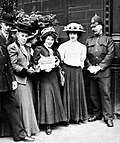
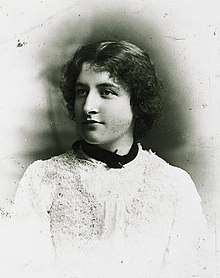
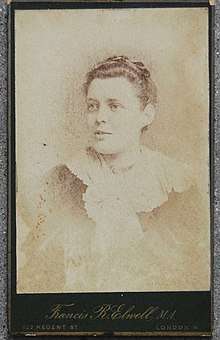
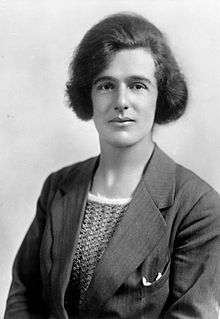
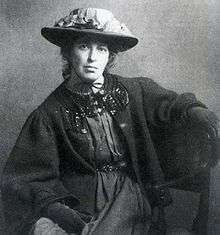
- Wilhelmina Hay Abbott (1884–1957) – editor and feminist lecturer, officer of the International Woman Suffrage Alliance
- Violet Aitken (1886–1987) – suffragette activist in the WSPU, imprisoned and force-fed, editor of The Suffragette
- Margaret Aldersley (1852–1940) – suffragist, feminist and trade unionist
- Mary Ann Aldham (1858–1940) – famously slashed a portrait in the Royal Academy in 1914
- Janie Allan (1868–1968) – suffragette activist and significant financial supporter of the WSPU; imprisoned for suffrage activities
- Doreen Allen (1879–1963) – militant suffragette
- Mary Sophia Allen (1878–1964) – women's rights activist, pioneer policewoman, later involved in far right political activity
- Katharine Russell, Viscountess Amberley (1844–1874) – early advocate of birth control, president of the Bristol and West of England Women's Suffrage Society
- Elizabeth Garrett Anderson (1836–1917) – physician, feminist, first dean of a British medical school, first female mayor, and magistrate in Britain
- Louisa Garrett Anderson (1873–1943) – Chief Surgeon of Women's Hospital Corps, Fellow of Royal Society of Medicine, jailed for her suffragist activities
- Helen Archdale (1876–1949) – suffragette and journalist
- Jane Arthur (1827–1907) – educationalist, feminist and activist; campaigned for women's suffrage
- Margaret Ashton (1856–1937) – suffragist, local politician, pacifist
- Nancy Astor, Viscountess Astor (1879–1964) – politician, socialite, first woman to sit as a Member of Parliament in the British House of Commons
- Barbara Ayrton-Gould (1886–1950) – Labour politician and co-founder of the United Suffragists; jailed for her suffrage activities
- Sarah Jane Baines (1866–1951) – feminist and social reformer; jailed at least fifteen times
- Minnie Baldock (c. 1864 – 1954) – co-founded the first London branch of the WSPU[2]
- Frances Balfour (1858–1931) – president of the National Society for Women's Suffrage
- Florence Balgarnie (1856–1928) – British suffragette, speaker, pacifist, feminist, temperance activist
- Rachel Barrett (1874–1953) – member of the WSPU; editor of The Suffragette
- Janet Barrowman (1879–1955) – Scottish member of the WSPU; jailed for her suffragist activities
- Dorothea Beale (1831–1906) – educational reformer, author, Principal of the Cheltenham Ladies' College
- Lydia Becker (1827–1890) – biologist and astronomer, founder and publisher of the Women's Suffrage Journal
- Edith Marian Begbie (1866–1932) – militant suffragette who was force-fed
- Mary Bell (1885–1943) – first Scottish women magistrate
- Sarah Benett (1850–1924) – Treasurer of the WFL and suffragette
- Ethel Bentham (1861–1931) – doctor, politician, member of the National Union of Women's Suffrage Societies
- Annie Besant (1847–1933) – socialist, theosophist, women's rights activist, writer, orator, and supporter of Irish and Indian self-rule
- Rosa May Billinghurst (1875–1953) – member of the WSPU; jailed multiple times
- Teresa Billington-Greig (1877–1964) – co-founder of Women's Freedom League; jailed for her suffragist activities
- Catherine Hogg Blair (1872–1946) – Scottish suffragette and founder of the Scottish Women's Rural Institute, and member of the WSPU
- Violet Bland (1863–1940) – member of the WSPU, force-fed in prison
- Barbara Bodichon (1827–1891) – educationalist, artist, feminist, activist for women's rights
- Margaret Bondfield (1873–1953) – politician, chair of the Adult Suffrage Society, first woman Cabinet minister in the United Kingdom
- Elsie Bowerman (1889–1973) – lawyer, member of the WSPU, RMS Titanic survivor
- Janet Boyd (1850–1928), militant suffragette and hunger-striker
- Jane Esdon Brailsford (1876–1937) – Scottish suffragette
- Agnes Brown (1866–1943) – Scottish suffragist and writer
- Annie Leigh Browne (1851–1936) – co-founder of College Hall, London and of Women's Local Government Society
- Constance Bryer (1870–1952) – suffragette
- Evaline Hilda Burkitt (1876–1955) – first suffragette to be force-fed
- Frances Buss (1827–1894) – headmistress, pioneer of women's education, member of the Kensington Society
- Josephine Butler (1828–1906) – feminist, author, social reformer concerned about the welfare of prostitutes
- Edward Caird (1835–1908) – founder member of the Glasgow and West of Scotland Association for Women's Suffrage
- Mona Caird (1854–1932) – English novelist and essayist who wrote in support of women's suffrage
- Mabel Capper (1888–1966) – activist in the WSPU; imprisoned many times, and force-fed
- Isabella Carrie (1878–1981) – schoolteacher and safe house keeper for the WSPU
- Dorothea Chalmers Smith (1874–1944) – doctor and suffragist
- Georgina Fanny Cheffins (1863–1932) – arrested for window smashing, held in HM Prison Holloway, force-fed
- Jane Clapperton (1832–1914) – philosopher, birth control pioneer, social reformer and suffragist
- Mary Jane Clarke (1862–1910) – arrested for window smashing, held in HM Prison Holloway, force-fed
- Anne Clough (1820–1892) – teacher and promoter of higher education for women
- Lila Clunas (1876–1968) – Scottish suffragette and Labour party councillor
- Jane Cobden (1851–1947) – Liberal politician who was active in many radical causes; co-founder of the Women's Franchise League
- Leonora Cohen (1873–1978) – militant British suffragette and trade unionist; bodyguard for Emmeline Pankhurst
- Florence Annie Conybeare (1872–1916) – campaigned in support of women's suffrage, organized a meeting of the National Union of Women's Suffrage Societies
- Selina Cooper (1864–1946) – textile mill worker, local magistrate, member of the North of England Society for Women's Suffrage
- Jessie Craigen (c.1835–1899) – working-class suffragist who gave speeches all around the country
- Virginia Mary Crawford (1862–1948) – Catholic suffragist, journalist and author, a founder of the Catholic Women's Suffrage Society.
- Helen Crawfurd (1877–1954) – suffragette, rent strike organiser and communist activist
- Maud Crofts (born 1889) – suffragist, author and first woman accepted as a solicitor[3][4]
- Mary Crudelius (1839–1877) – early supporter of women's suffrage and campaigner for women's education
- Helen Cruickshank (1886–1975) – was a Scottish poet and suffragette
- Emily Davies (1830–1921) – co-founder of Kensington Society and Britain's first women's college, Girton College, Cambridge University
- Emily Wilding Davison (1872–1913) – militant activist, key member of the WSPU, died in a protest action at a racetrack
- John McAusland Denny (1858–1922) Scottish businessman, Conservative Party politician and founder member of the Glasgow and West of Scotland Association for Women's Suffrage
- Charlotte Despard (1844–1939) – novelist, Sinn Féin activist, co-founder of the Women's Freedom League
- Agnes Dollan (1887–1966) – Scottish suffragette, political activist and pacifist
- Violet Mary Doudney (1889–1952) – teacher and militant suffragette
- Katherine Douglas Smith (1878–) – militant suffragette and WSPU organiser
- Flora Drummond (1878–1949) – organiser for WSPU, imprisoned nine times for her activism in Women's Suffrage movement, inspiring orator
- Marion Wallace Dunlop (1864–1942) – artist and suffragette
- Elsie Duval (1892–1919) – member of WSPU and first woman released under the Cat and Mouse Act
- Maude Edwards – suffragette
- Norah Elam (1878–1961) – prominent member of the WSPU; imprisoned three times
- Elizabeth Clarke Wolstenholme Elmy (1833–1918) – public speaker and writer; formed the first British suffragist society, first paid employee of the British Women's Movement
- Dorothy Evans (1888–1944) – activist and organiser, worked for WSPU; imprisoned several times
- Kate Williams Evans – (1866–1961) – suffragette
- Caprina Fahey – (1883–1959), received the Women's Social and Political Union (WSPU) Hunger Strike Medal "for Valour" in 1914[5]
- Millicent Fawcett (1847–1929) – feminist, writer, political and union leader; president of the National Union of Women's Suffrage Societies
- Helen Fraser (1881–1979) – suffragist, speaker and artist
- Elizabeth Fry (1780–1845) – prison reformer, social reformer, philanthropist
- Edith Margaret Garrud (1872–1971) – first trainer of 'the Bodyguard', formed in response to the Cat and Mouse Act
- Katharine Gatty (1870–1952) – journalist, lecturer and militant suffragette for the WSPU
- Mary Gawthorpe (1881–1973) – socialist, trade unionist, editor, active in the suffrage movement in both England and the United States
- Ellison Scotland Gibb (1879–1970) – suffragette and chess player
- Margaret Skirving Gibb (1877–1954) – suffragette and chess player
- Marion Gilchrist (1864–1952) – doctor and suffragist
- Katie Edith Gliddon (1883–1967) – watercolour artist and militant suffragette.
- Frances Gordon (born c. 1874) – prominent in the militant wing of the Scottish women's suffrage movement; imprisoned and force-fed
- Gerald Gould (1885–1936) – writer, known as a journalist, reviewer, essayist, and poet; co-founder of United Suffragists
- Mary Pollock Grant (1876–1957) – Scottish suffragette, Liberal Party politician, missionary and policewoman.
- Elsa Gye (1881–1943) – Scottish suffragette, imprisoned for the cause, led WSPU branches in Nottingham and Newcastle
- Joan Lavender Bailie Guthrie (Laura Grey) (1888–1914) – suffragette and actress, imprisoned for window smashing
- Beatrice Forbes-Robertson Hale (1883–1967) – actress, lectured and wrote on women's rights
- Cicely Hale (1884–1981) – health visitor and author; worked for the WSPU and The Suffragette
- Nellie Hall (1895–1929) – god-daughter of Emmeline Pankhurst, member of the WSPU; imprisoned twice
- Hazel Hunkins Hallinan (1890–1982)
- Cicely Hamilton (1872–1952) – actress, writer, journalist, feminist
- Ishbel Hamilton-Gordon (1857–1939) – author, philanthropist, and an advocate of woman's interests
- Marion Coates Hansen (1870–1947) – early member of the WSPU, co-founder of the Women's Freedom League
- Keir Hardie (1856 -1915) – Scottish founder of the Labour Party, later a campaigner for women's suffrage
- Emily J. Harding (1850–1940) – British artist, illustrator and suffragette
- Jane Ellen Harrison (1850–1928) – linguist, feminist, co-founder of modern studies in Greek mythology, supporter of women's suffrage
- Evelina Haverfield (1867–1920) – aid worker and nurse in WWI, member of the WSPU, arrested several times
- Annie Elizabeth Helme – suffragist, JP, first female mayor of Lancaster in 1932.[6]
- Margaret Hills (1882–1967) – teacher, public speaker, feminist and socialist; organizer of the NUWSS Election Fighting Fund
- Reverend Claude Hinscliff (1875–1964) – founder of the [Anglican] Church League for Women's Suffrage[7][8]
- Emily Hobhouse (1860–1926) – exposed the squalid conditions in concentration camps in South Africa during the Second Boer War; active in the People's Suffrage Federation
- Olive Hockin (1881–1936) – artist and author; imprisoned after arson attacks suspected to be suffragette-related
- Winifred Holtby (1898–1935) – feminist, socialist, and writer, including a new voters guide for women in 1929
- Edith Sophia Hooper (1868–1926)- suffragist and biographer of Josephine Butler
- Winifred Horrabin (1887–1971) – socialist activist, journalist, member of the WSPU
- Clemence Housman (1861–1955) – author, illustrator, co-founder of the Suffrage Atelier
- Laurence Housman (1865–1959) – playwright, writer, illustrator, co-founder of the Suffrage Atelier
- Elizabeth How-Martyn (1875–1954) – member of the WSPU and co-founder of the Women's Freedom League
- Ellen Hughes (1867–1927) – Welsh writer, poet, suffragist
- Florence Hull (b.1878) – suffragette, member of WSPU, imprisoned in January 1913
- Agnes Husband (1852–1929) – Scottish politician and suffragette
- Elsie Inglis (1864–1917) – Scottish doctor, secretary of the Edinburgh National Society for Women's Suffrage
- Margaret Irwin (1858–1940) – trade unionist, suffragist and founder member of the Glasgow and West of Scotland Association for Women's Suffrage
- Christina Jamieson (1864–1942) – writer and suffragette
- Maud Joachim (1869–1947) – suffragette
- Ellen Isabel Jones (d.1948) – suffragette and close associate of the Pankhursts
- Helena Jones (b.1870) – Welsh doctor and member of the WSPU, later critical of Emmeline Pankhurst
- Mabel Jones (1865 -1923) – doctor and suffragette
- Annie Kenney (1879–1953) – leading figure in the WSPU
- Jessie Kenney (1887–1985) – leading suffragette, assaulted the British prime minister and the Home Secretary at golf course
- Nell Kenney (1876–1953) – suffragette
- Jessie Keppie (1868–1951) – artist and subscriber to Glasgow and West of Scotland Association for Women's Suffrage
- Alice Stewart Ker (1853–1943) – doctor, health educator and suffragette
- Edith Key (1872–1937) – secretary-organiser of the WSPU, Huddersfield branch, and author of the only surviving regional WSPU minute book
- Mary Stewart Kilgour (1851–1955) – educationalist and writer, co-founder of the Union of Practical Suffragists
- Adelaide Knight, (1871–1950) – secretary for the WSPU in Canning Town[9][10]
- Anne Knight (1786–1862) – social reformer, pioneer of feminism, early suffragette and pamphleteer
- Annie Knight (1895–2006) – suffragette in Aberdeen Scotland
- Aeta Adelaide Lamb (1886–1928) – longest serving organiser in the WSPU
- George Lansbury (1859–1940) – social reformer and politician who allied himself with the WSPU
- Jennie Lee (1904–1988) – Scottish politician, elected MP aged 24 in 1929 by-election before suffrage was extended to women under 30
- Lilian Lenton (1891–1972) – active member of the WSPU, winner of a French Red Cross for her service in WWI
- Victoria Lidiard (1889–1992) – WPSU member and reputed to be the longest surviving British Suffragette.[11]
- Thomas Martin Lindsay (1843–1914) – Scottish historian, professor and founder member of the Glasgow and West of Scotland Association for Women's Suffrage
- Kathleen Lyttelton (1856–1907) – women's activist, editor and writer
- Lady Constance Lytton (1869–1923) – speaker and campaigner for prison reform, votes for women, and birth control
- Florence Macfarlane (1867–1947), nurse and militant member of the WSPU
- Margaret Mackworth (1883–1958) – activist and director of more than thirty companies
- Sarah Mair (1846–1941) – campaigner and founder
- Lavinia Malcolm (1847–1920) – Scottish suffragist and local Liberal Movement politician, the first Scottish woman to be elected to a local council (1907) and the first woman Lord Provost of a Scottish burgh town, in Dollar, Clackmannanshire
- Edith Mansell Moullin (1859–1941) – suffragist, settlement worker, and Welsh feminist organisation founder
- Kitty Marion (1871–1944) – actress and political activist
- Dora Marsden (1882–1960) – anarcho-feminist, editor of literary journals, and philosopher of language
- Charlotte Marsh (1842–1909) – joined the WSPU in March 1907. In March 1916 she set up the Independent WSPU
- Selina Martin (1882–1972) – activist
- Harriet Martineau (1802–1876) – social theorist and writer
- Eleanor Marx (1855–1898) – activist and translator
- Flora Masson (1856–1937) – nurse, editor and writer
- Helen Matthews – Scottish suffragette and women's footballer
- Isabella Fyvie Mayo (1843–1914) – poet, novelist, suffragist, and reformer
- Mary Macarthur (1880–1921) – general secretary of the Women's Trade Union League and was involved in the formation of the National Federation of Women Workers and National Anti-Sweating League
- Ann Macbeth (1875–1948) – artist and suffragist
- Lilly Maxwell (1800–1876) suffragist
- Janet McCallum (1881–1946) – trade unionist and suffragist
- Agnes Syme Macdonald (1882–1966) – was a Scottish suffragette who served as the secretary of the Edinburgh branch of the WSPU before setting up the Edinburgh Women Citizens Association (WCA) in 1918.
- Agnes McLaren (1837–1913) – doctor and secretary of the Edinburgh National Society for Women's Suffrage alongside her stepmother, Priscilla Bright McLaren
- Alice McLaren (1860–1945) – doctor, Gynecologist, suffragist and advocate for women's health and women's rights
- Eva McLaren (1852–1921) – suffragist, writer, and political campaigner
- Priscilla Bright McLaren (1815–1906) – anti-slavery activist, Scottish suffragist, founder and president of Edinburgh National Society for Women's Suffrage
- Chrystal Macmillan (1872–1937) – politician, barrister, feminist and pacifist
- Frances McPhun (1880–1940) – suffragette who served two months in Holloway prison, sister of Margaret McPhun
- Margaret McPhun (1876–1960) – suffragette who served two months in Holloway prison, sister of Frances McPhun
- Frances Melville (1873–1962) – suffragist, advocate for higher education for women in Scotland, and one of the first women to matriculate at the University of Edinburgh
- Jessie C. Methven (1854–1917) – Scottish suffragist, suffragette, honorary secretary of Edinburgh National Society for Women's Suffrage, joined WSPU 1906
- Alice Meynell (1847–1922) – editor, writer, and poet
- Harriet Taylor Mill (1807–1858) – philosopher and women's rights advocate
- John Stuart Mill (1806–1873) – philosopher, political economist, and civil servant
- Hannah Mitchell (1872–1956) – activist
- Dora Montefiore (1851–1933) – activist and writer
- Ethel Moorhead (1869–1955) – painter
- Graham Moffat (1866–1951) – actor, director, playwright and spiritualist. Husband of Maggie Moffat and founder of the Men's League for Women's Suffrage
- Maggie Moffat (1873–1943) – British actor and suffragette, wife of Graham Moffat
- Ethel Moorhead (1869–1955) – suffragette and painter
- Anna Munro (1881–1962) – activist
- Eunice Murray (1878–1960) – only Scottish woman who stood for election when UK elections were opened to women in 1918.
- Flora Murray (1869–1923) – medical pioneer and activist
- Frances Murray (1843–1919) – a suffragist raised in Scotland, an advocate of women's education, a lecturer in Scottish music and a writer.
- Sylvia Murray (1875–1955) – suffragette and author, the sister of suffragette Eunice Guthrie Murray.
- Margaret Mylne (1806–1892) – Scottish suffragette and writer
- Mary Neal (1860–1944) – social worker and collector of English folk dances
- Alison Roberta Noble Neilans (1884–1942) – activist, member of the executive committee of the Women's Freedom League
- Margaret Nevinson (1858–1932) – JP, Poor Law guardian, playwright, member of the Church League for Women's Suffrage
- Jessie Newbery (1864–1948) – artist and suffragist
- Elizabeth Pease Nicholl (1807–1897) – abolitionist, anti-segregationist, suffragist, chartist and anti-vivisectionist
- Helen Ogston – suffragette
- Ada Nield Chew (1870–1945) – organiser
- Florence Nightingale (1820–1910) – celebrated social reformer and statistician, and the founder of modern nursing
- Emily Rosaline Orme (1835–1915) – member of the Edinburgh National Society for Women's Suffrage
- Elizabeth Margaret Pace (1866–1957) – Scottish doctor, suffragist and advocate for women's health and women's rights
- Adela Pankhurst (1885–1961) – political organizer, co-founder of the Communist Party of Australia and the Australia First Movement
- Christabel Pankhurst (1880–1958) – co-founder and leader of the WSPU
- Emmeline Pankhurst (1858–1928) – a main founder and the leader of the British Suffragette Movement
- Sylvia Pankhurst (1882–1960) – campaigner and anti-fascism activist
- Frances Mary "Fanny" Parker OBE (1875–1924) – New Zealand-born suffragette prominent in the militant wing of the Scottish women's suffrage movement and repeatedly imprisoned for her actions
- Grace Paterson (1843–1925) School board member, temperance activist, suffragist, and founder of the Glasgow School of Cookery
- Isabella Bream Pearce (1859–1929) Scottish socialist propagandist and suffrage campaigner
Annie Seymour Pearson born 1878 was a women's suffrage activist who ran a safe house for suffragettes evading police.[1]
- Annie Seymour Pearson (1878–?) Work based suffrage activist who ran a safe house for suffragettes evading police
- Edith Pechey (1845–1908) – campaigner for women's rights, involved in a range of social causes
- Pleasance Pendred (1864–1948) – suffragette
- Emmeline Pethick-Lawrence (1867–1954) – member Suffrage Society, secretary WSPU
- Caroline Philips (1874–1956) – feminist, suffragette and journalist
- Catherine Pine (1864–1941) – nurse, suffragette
- Isabella Potbury (1890–1965) – portrait painter, suffragette
- Clara Rackham (1875–1966) – magistrate, prison reformer, factory inspector, long-serving alderman and city councillor in Cambridge
- Jane Rae (1872–1959) – political activist, suffragette, councillor and Justice of the peace
- Eleanor Rathbone (1872–1946) – campaigner for women's rights
- Marion Kirkland Reid (1815–1902) – feminist and writer
- Mary Reid (1880–1921) – Scottish trades unionist
- Margaret Mackworth, 2nd Viscountess Rhondda (1883–1955) – WSPU member, journalist, business woman, founder of the feminist periodical Time and Tide.
- Mary Richardson (1882–1961) – Canadian suffragette, arsonist, head of the women's section of the British Union of Fascists
- Edith Rigby (1872–1948) – founder of St. Peter's School, prominent activist
- Margaret Robertson (1892–1967) – campaigner; organiser of the Election Fighting Fund
- Elizabeth Robins (1862–1952) – Ibsen actress, playwright, public speaker, novelist
- Annot Robinson (1874–1925) – née Wilkie, nicknamed Annie, pacifist and suffragette[12][13]
- Rona Robinson (1881–1973) – suffragette and in 1905 the first woman in the United Kingdom to gain a first-class degree in chemistry
- Esther Roper (1868–1938) – social justice campaigner
- Arnold Stephenson Rowntree (1872–1951) – MP, philanthropist, and suffragist
- Lolita Roy – believed to have been an important organizer of the Women's Coronation Procession (a suffrage march in London) in 1911, and marched as part of it with either her sisters or her daughters[14][15]
- Agnes Royden (1876–1956) – preacher
- Bertha Ryland (1882–1977), militant suffragette
- Myra Sadd Brown (1872–1938) – suffragette activist in the WSPU, imprisoned and force-fed
- Margaret Sandhurst (1828–1892) – one of the first women elected to a city council in the United Kingdom
- Arabella Scott (1886–1980) – Scottish suffragette who endured five weeks of solitary confinement in Perth prison and force feeding twice a day
- Evelyn Sharp (suffragist) (1869–1955) – journalist on The Manchester Guardian, short story writer, tax resister, founder of the United Suffragists
- Genie Sheppard (1863–1953), medical doctor and militant suffragette
- Alice Maud Shipley (1869–1951), suffragist who went on hunger strike in Holloway Prison and who was force fed
- Frances Simson (1854–1938) – suffragist, campaigner for women's higher education and one of the first of eight women graduates from the University of Edinburgh
- Sophia Duleep Singh (1876–1948) – had leading roles in the Women's Tax Resistance League, and the WSPU
- Margaret Skinnider (1892–1971) –
- Ethel Smyth (1858–1944) – composer, writer
- Mary Anderson Snodgrass (1862–1945) – politician, suffragist and advocate for women's rights, member of the Glasgow and West of Scotland Association for Women's Suffrage
- Ethel Snowden (1881–1951) – socialist, human rights activist, feminist politician
- Georgiana Solomon (1844–1933) – member of the WSPU
- Mary Somerville (1780–1872) – science writer and polymath
- Emma Sproson (1867–1936)- women's rights activist
- Emily Spender (1841–1922) – novelist and suffragette
- Lady Barbara Steel (1857–1943) – Scottish suffragist and tax resister
- Jessie Stephen – (1893–1979) – working class suffragette and trade union activist
- Flora Stevenson (1839–1905) – Scottish social reformer with interest in education for poor or neglected children
- Louisa Stevenson (1835–1908) – Scottish campaigner for women's university education, effective, well-organised nursing
- Charlotte Carmichael Stopes (1840–1929) – scholar, author, and campaigner for women's rights
- Una Harriet Ella Stratford Duval (née Dugdale) (1879–1975) – suffragette and marriage reformer
- Lucy Deane Streatfeild (1865–1950) – civil servant, social worker, one of the first female factory inspectors in UK
- Annie S. Swan (1859–1943) – journalist, novelist and story writer
- Helena Swanwick (1864–1939) – feminist, pacifist
- Jane Taylour (1827–1905) – suffragist and women's movement campaigner
- Janie Terrero (1858–1944) – militant suffragette
- Dora Thewlis (1890–1976) – activist
- Agnes Thomson (b.1846) – Scottish suffragette, member of Edinburgh WSPU, missionary in India
- Elizabeth Thomson (b.1848) – Scottish suffragette, member of Edinburgh WSPU, hunger striker, missionary in India
- Elizabeth Thompson (1846–1933) – prominent painter
- Muriel Thompson (1875–1939) – World War I ambulance driver, racing driver and suffragist
- Violet Tillard (1874–1922) – nurse, pacifist, supporter of conscientious objectors, relief worker
- Isabella Tod (1836–1896) – Scottish suffragist, women's rights campaigner and unionist politician in Ireland
- Catherine Tolson (1890–1924) – suffragette
- Helen Tolson (1888–1955) – suffragette
- Florence Tunks (1891–1985) – suffragette
- Minnie Turner (1866–1948) – ran a guest house, the "Sea View", in Brighton
- Marion Wallace Dunlop (1864–1942) – suffragette went on hunger strike after being arrested for militancy
- Olive Grace Walton – (1886–1937) – suffragette
- Elizabeth (Bessie) Watson (1900–1992) – child suffragette and piper
- Mona Chalmers Watson (1872–1936) – physician and head of the Women's Army Auxiliary Corps
- Harriet Shaw Weaver (1876–1961) – political activist, magazine editor
- Beatrice Webb (1858–1943) – sociologist, economist, socialist, labour historian, social reformer
- Vera Wentworth (1890–1957) – went to Holloway for the cause and was force fed. She door stepped and then assaulted the Prime Minister twice. She wrote "Three Months in Holloway".
- Rebecca West (1892–1983) – author, journalist, literary critic, travel writer
- Olive Wharry (1886–1947) – artist, arsonist
- Eliza Wigham (1820–1899) – suffragist and abolitionist
- Jane Wigham (1801–1888) – suffragist and abolitionist
- Ellen Wilkinson (1891–1947) – politician, Member of Parliament, served as Minister of Education
- Gertrude Wilkinson (1851–1929) – militant suffragette and member of the Women's Social and Political Union
- Laetitia Withall (1881–1963) – poet, author and militant suffragette
- Celia Wray (1872–1954), suffragette and architect
- I.A.R. Wylie (1885–1959) – Australian writer, suffragette in UK, working on The Suffragette
- Alice Zimmern (1855–1939) – teacher, writer
United States
- Mary Newbury Adams (1837–1901) – suffragist and education advocate[16]
- Sadie L. Adams (1872–1945) – African-American suffragist and child welfare advocate.
- Jane Addams (1860–1935) – social activist, president Women's International League for Peace and Freedom
- Edith Ainge (1873–1948) – member of Silent Sentinels, Treasurer for NWP, jailed five times.[17][18][19]
- Mary A. Ahrens (1836-after 1907) – Chicago lawyer, plaintiff in lawsuit to enforce 1891 suffrage law for school elections
- Mary Long Alderson (1860–1937) – Montana suffragist
- Nina E. Allender (1873–1957) – speaker, organizer and cartoonist
- Naomi Anderson (born 1863) – black suffragist, temperance advocate
- Susan B. Anthony (1820–1906) – co-founder and leader National Woman Suffrage Association, one of the leaders of the National American Woman Suffrage Association; Nineteenth Amendment to the United States Constitution, which guaranteed the right of women to vote, was popularly known as the Susan B. Anthony Amendment[20]
- Annie Arniel (1873–1924) – member of the Silent Sentinels, arrested eight times in direct actions
- Helen Vickroy Austin (1829–1921) – journalist, horticulturist, suffragist
- Rosa Miller Avery (1830–1894) – American abolitionist, political reformer, suffragist, writer
- Elnora Monroe Babcock (1852–1934) – pioneer leader in the suffrage movement; chair of the National Woman Suffrage Association's press department
- Eugenia M. Bacon (1853–1933) – suffragist
- Adella Brown Bailey (1860–1937) – politician and suffragist
- Ida B. Wells-Barnett (1862–1931) – African-American journalist, newspaper editor, suffragist, sociologist, and early leader in the civil rights movement
- Bertha Hirsch Baruch – writer, president of the Los Angeles Suffrage Association
- Helen Valeska Bary (1888–1973) – suffragist, researcher, and social reformer[21][22]
- Alva Belmont (1853–1933) – founder of the Political Equality League that was in 1913 merged into the Congressional Union for Woman Suffrage
- Kate Himrod Biggers (1849–1935)- president of the Oklahoma Woman's Suffrage Association
- Irene Moorman Blackstone (1872-after 1944) African-American suffragist instrumental in integrating the suffrage fight in New York
- Alice Stone Blackwell (1857–1950) – journalist, activist
- Antoinette Brown Blackwell (1825–1921) – co-founder, with Lucy Stone, of the American Woman Suffrage Association
- Henry Browne Blackwell (1825–1909) – founded Woman's Journal with Lucy Stone
- Katherine Devereux Blake (1858–1950) – educator, suffragist, peace activist
- Lillie Devereux Blake (1833–1913) – writer, suffragist, reformer
- Lucretia Longshore Blankenburg (1845–1937) – suffragist, reformer
- Isabella Williams Blaney (1854–1933) – suffragist, politician
- Harriot Eaton Stanton Blatch (1856–1940) – writer (contributor to History of Woman Suffrage), founded Women's Political Union, daughter of pioneering activist Elizabeth Cady Stanton
- Amelia Bloomer (1818–1894) – women's rights and temperance advocate; her name was associated with women's clothing reform style known as bloomers
- Anna Whitehead Bodeker (1826–1904) — leader of the earliest attempts to organize for suffrage in Virginia; co-founder and inaugural president of Virginia State Woman Suffrage Association, the first suffrage association in Virginia
- Marietta Bones (4 May 1842 – 11 July 1901) – suffragist, social reformer, philanthropist
- Helen Varick Boswell (1869–1942) – member of the Woman's National Republican Association and the General Federation of Women's Clubs
- Lucy Gwynne Branham (1892–1966) – professor, organizer, lobbyist, active in the National Women's Party and its Silent Sentinels, daughter of suffragette Lucy Fisher Gwynne Branham
- Madeline McDowell Breckinridge (1872–1920) – suffrage leader, one-time vice president of the National Woman Suffrage Association, one of Kentucky's leading Progressive reformers
- Sophonisba Breckinridge (1866–1948) – activist, Progressive Era social reformer, social scientist and innovator in higher education
- Minerva Kline Brooks (1883–1929) – suffragist
- Gertrude Foster Brown (1867–1956) – pianist, suffragette, author of Your vote and how to use it (1918)
- Olympia Brown (1835–1926) – activist, first woman to graduate from a theological school, as well as becoming the first full-time ordained minister
- Emma Bugbee (1888–1981) – journalist
- Emeline S. Burlingame (1836–1923) – editor, evangelist, suffragist
- Lucy Burns (1879–1966) – women's rights advocate, co-founder of the National Woman's Party
- Mary Edith Campbell (1876–1962) – first woman elected to the Board of Education in Cincinnati, Ohio
- Jennie Curtis Cannon (1851–1929) – Vice President of the National American Woman Suffrage Association
- Frances Jennings Casement (1840–1928) – voting advocate, married General John S. Casement, who lobbied for voting rights for women
- Carrie Chapman Catt (1859–1947) – president of the National American Woman Suffrage Association, founder of the League of Women Voters and the International Alliance of Women, campaigned for the Nineteenth Amendment to the United States Constitution
- Emily Thornton Charles (1845–1895) – poet, journalist, suffragist, newspaper founder
- Tennessee Celeste Claflin (1844–1923) – one of the first women to open a Wall Street brokerage firm, advocate of legalized prostitution
- Adele Goodman Clark (27 September 1882 – 4 June 1983) artist, suffragist, and co-founder of the Equal Suffrage League of Virginia
- Laura Clay (1849–1941) – co-founder and first president of Kentucky Equal Rights Association, leader of women's suffrage movement, active in the Democratic Party
- Mary Barr Clay (1839–1924) – first Kentuckian to hold the office of president in a national woman's organization (American Woman Suffrage Association), and the first Kentucky woman to speak publicly on women's rights
- Lillian Exum Clement (1894–1925) – first woman elected to the North Carolina General Assembly and the first woman to serve in any state legislature in the Southern United States
- H. Maria George Colby (1844–1910) – journalist, activist, suffragist
- Emily Parmely Collins (1814–1909) – suffragist, activist, writer
- Jennie Collins (1828–1887) – labor reformer, humanitarian, and suffragist
- Mattie E. Coleman (1870–1943) – physician, suffragist
- Sarah Tarleton Colvin (1865–1949) – chairman of the Minnesota chapter of the National Woman's Party, arrested during the "Watchfire for Freedom" demonstrations
- Helen Appo Cook (1837–1913) – prominent African American community activist and leader in the women's club movement.
- Ida Craft – known as the Colonel, took part in Suffrage Hikes
- Emma Amelia Cranmer (1858–1937) – reformer, suffragist, writer
- Minnie Fisher Cunningham (1882–1964) – first executive secretary of the League of Women Voters, member of the National American Women's Suffrage Association
- Lucile Atcherson Curtis (1894–1986) – first woman in what became the US Foreign Service
- Martha E. Sewall Curtis (1858–1915), suffragist, writer
- Madeleine Vinton Dahlgren (1825–1889) – writer, translator, anti-suffragist
- Lucinda Lee Dalton (1847–1925) – Mormon feminist and writer
- Carrie Chase Davis (1863–1953), physician, suffragist
- Paulina Kellogg Wright Davis (1813–1876) – a founder of the New England Woman Suffrage Association; active with the National Woman Suffrage Association; co-arranged and presided at the first National Women's Rights Convention
- Jesse Leech Davisson (1860–1940) – suffragist active in Ohio
- Cornelia De Bey (1860–1948) – homeopath, politician, suffragist, educator
- Emma Smith DeVoe (1848–1927) leading Washington State suffragist, founded the National Council of Women Voters.
- Mamie Dillard (1874–1954) – African American educator, clubwoman and suffragist
- Mary L. Doe (1836–?) – first president of the Michigan State Equal Suffrage Association
- Rheta Childe Dorr (1868–1948) – journalist, suffragist newspaper editor, writer, and political activist
- Eva Craig Graves Doughty (1852–?) – journalist, suffragist
- Frederick Douglass (1818–1895) – African-American social reformer, orator, writer, statesman
- Wilhelmine Kekelaokalaninui Widemann Dowsett (1861–1929) – Native Hawaiian suffragist, organized the National Women's Equal Suffrage Association of Hawaii
- Anne Dallas Dudley (1876–1955) – suffrage activist; in 1920, she, along with Abby Crawford Milton and Catherine Talty Kenny, led the campaign in Tennessee to approve ratification of the Nineteenth Amendment to the United States Constitution[23][24]
- Abigail Scott Duniway (1834–1915) – women's rights advocate, editor, writer
- Zara DuPont (1869–1946) – first Vice President of the Ohio Woman Suffrage Association
- Crystal Eastman (1881–1928) – lawyer, antimilitarist, feminist, socialist, and journalist
- Mary F. Eastman – educator, lecturer, writer, and suffragette
- Max Eastman (1883–1969) – writer, philosopher, poet, prominent political activist
- Mary G. Charlton Edholm (1854–1935) — reformer and journalist
- Katherine Philips Edson (1870–1933) – social worker and feminist, worked to add women's suffrage to the California State Constitution
- Elizabeth Piper Ensley (1848–1919) – Caribbean-American woman who was the treasurer of the Colorado Non-Partisan Equal Suffrage Association
- Helga Estby (1860–1942) – Norwegian immigrant, noted for her walk across the United States during 1896 to save her family farm
- Caroline McCullough Everhard (1843–1902) – American banker and suffragist, president of the Ohio Suffrage Association
- Elizabeth Glendower Evans (1856–1937) – social reformer and suffragist
- Janet Ayer Fairbank (1878–1951) – author and champion of progressive causes
- Lillian Feickert (1877–1945) – suffragette; first woman from New Jersey to run for United States Senate[25]
- Susan Frances Nelson Ferree (1844–1919) – journalist, activist, suffragist
- Sara Bard Field (1882–1974) – active with the National Advisory Council, National Woman's Party, and in Oregon and Nevada; crossed the US to deliver a petition with 500,000 signatures to President Wilson
- Margaret Foley (1875–1957) – active with the Massachusetts Woman Suffrage Association
- Jessica Garretson Finch – president of the New York Equal Franchise Society
- Mariana Thompson Folsom (30 July 1845 – 31 January 1909) – Universalist minister and lecturer for Iowa Suffrage Association and Texas Equal Rights[26]
- Clara S. Foltz (1849–1934) – lawyer, sister of US Senator Samuel M. Shortridge
- Nellie Griswold Francis (1874–1969) – founded and led the Everywoman Suffrage Club, an African-American suffragist group in Minnesota, civil rights and anti-lynching activist
- Ellen Sulley Fray (1832–1903) – one of the district presidents of the Ohio Women's Suffrage Association
- Elisabeth Freeman (1876–1942) – Suffrage Hike participant
- Antoinette Funk (1869–1942) – lawyer and executive secretary of the Congressional Committee of the National American Woman Suffrage Association; supporter of the women's movement in WWI
- Matilda Joslyn Gage (1826–1898) – activist, freethinker, author
- Edna Fischel Gellhorn (1878–1970) – reformer, co-founder of the National League of Women Voters
- Sallie Topkis Ginns (1880–1976) – inductee in the Hall of Fame of Delaware Women
- Mary Tenney Gray (1833–1904) – writer, clubwoman, philanthropist, suffragist
- Helen Hoy Greeley (1878–1965) – Secretary, New Jersey Next Campaign (1915), stump speaker, organizer, and mobilizer in California and Oregon campaigns (1911), speaker for Women's Political Union in NYC[27][28]
- Irene W. Griffin (d. 2012) – first black woman to register to vote in Plaquemines Parish, Louisiana
- Josephine Sophia White Griffing (1814–1872) – active in the American Equal Rights Association and the National Woman Suffrage Association
- Sarah Grimke (1792–1873) – abolitionist, writer
- Eliza Calvert Hall (pen name of Eliza Caroline "Lida" Calvert Obenchain) (1856–1935) – author, women's rights advocate
- Ida Husted Harper (1851–1931) – organizer, major writer and historian of the US suffrage movement
- Florence Jaffray Harriman (1870–1967) – social reformer, organiser and diplomat
- Mary Garrett Hay (1857–1928) – companion to Carrie Chapman Catt and suffrage organizer in New York
- Gillette Hayden (1880–1929) – dentist and periodontist[29]
- Sallie Davis Hayden (1842–1907) – one of the founders of the suffrage movement in Arizona
- Josephine K. Henry (1846–1928) – Progressive Era women's rights leader, social reformer and writer
- Katharine Houghton Hepburn (1878–1951) – social reformer – National Women's Party chairman in Connecticut. Graduate of Bryn Mawr College. Mother of Katharine Hepburn.
- Elsie Hill (1883–1970) – activist
- Helena Hill (1875–1958) – activist, geologist
- Edith Houghton Hooker (1879–1948) – activist, editor The Suffragist
- Julia Ward Howe (1819–1910) – prominent abolitionist, social activist and poet
- Emily Howland (1827–1929) – philanthropist, educator
- Florence Frances Huberwald – singer, teacher, suffragist, national leader of the women's movement
- Josephine Brawley Hughes (1839–1926) – established the Arizona Suffrage Association in 1891
- Sarah Gibson Humphreys (1830–1907) – author, suffragist
- Addie Waites Hunton (1866–1943) — suffragist, race and gender activist, writer, political organizer, educator
- Cornelia Collins Hussey (1827–1902) — philanthropist, writer
- May Arkwright Hutton (1860–1915) – suffrage leader and labor rights advocate in the Pacific Northwest.
- Inez Haynes Irwin (1873–1970) – co-founder of the College Equal Suffrage League, active in National Woman's Party, wrote the party's history
- Lottie Wilson Jackson (1854–1914) – painter and suffragist
- Mary Corinna Putnam Jacobi (1842–1906) – an esteemed American medical physician, teacher, scientist, and writer[30]
- Ada James (1876–1952) – social worker and reformer
- Martha Waldron Janes (1832–?) – minister, suffragist, columnist
- Hester C. Jeffrey (1842–1934) – African American community organizer, creator of the Susan B. Anthony clubs
- Izetta Jewel (1883–1978) – stage actress, women's rights activist, politician and first woman to second the nomination of a presidential candidate at a major American political party convention
- Laura M. Johns (1849–1935) — suffragist, journalist
- Adelaide Johnson (1859–1955) – sculptor who created a monument for suffragists in Washington D.C.
- Harriet C. Johnson (1845–1907) — suffragist, educator
- Lucy Browne Johnston (1846–1937) – president of the Kansas Federation of Women's Clubs, and was involved in the Kansas Equal Suffrage Association
- Effie McCollum Jones (1869–1952) – American Universalist minister and suffragist
- Jane Elizabeth Jones (1813–1896) – suffragist, abolitionist, member of the early women's rights movement.
- Rosalie Gardiner Jones (1883–1978) – socialite, took part in Suffrage Hike, known as "General Jones"
- Caroline Katzenstein (1888–1968) – American suffragist and author from Philadelphia, helped form the National Woman's Party
- Belle Kearney (1863–1939) – speaker and lobbyist for the National American Woman Suffrage Association; first woman elected to the Mississippi State Senate
- Edna Buckman Kearns (1882–1934) – National Woman's Party campaigner, known for her horse-drawn suffrage campaign wagon (now in the collection of New York State Museum)
- Mary Morton Kehew (1859–1918) – labor/social reformer and suffragist from Boston
- Eliza D. Keith (1854–1939) – educator, suffragist, journalist
- Helen Keller (1880–1968) – author and political activist
- Abby Kelley (1811–1887) – abolitionist, radical social reformer, fundraiser, lecturer and organizer for the American Anti-Slavery Society
- Elizabeth Thacher Kent (1868–1952) – feminist, suffragist, environmentalist
- Caroline Burnham Kilgore (1838–1909) – the first woman to be admitted to the bar in the Commonwealth of Pennsylvania
- Sarah Knox-Goodrich (1826–1903) – women's rights activist from San Jose, California
- Daisy Elizabeth Adams Lampkin (1883–1965) – civil rights activist, organization executive, and community practitioner
- Orra Henderson Moore Gray Langhorne (1841–1904) suffragist, founder of Virginia Suffrage Society
- Mary Torrans Lathrap (1838–1895) – poet, preacher, suffragist, social reformer
- Clara Chan Lee (1886–1993) – first Chinese American to register to vote in the US, 8 November 1911[31]
- Mabel Ping-Hua Lee (1896–1966) – suffragist, advocate for women's rights and for the Chinese immigrant community
- Dora Lewis (1862–1928) – in 1913 became an executive member of the National Women's Party; in 1918 became their chairwoman of finance; in 1919 became their national treasurer; in 1920 headed their ratification committee
- Miriam Leslie (1836–1914) – publisher, author; namesake of the Leslie Woman Suffrage Commission
- Lena Morrow Lewis (1868–1950) – organizer in South Dakota and Oregon; enlisted the support of labor unions
- Mary Livermore (1820–1905) – journalist and advocate of women's rights
- Sarah Hunt Lockrey (1863–1929) – physician and suffragist
- Adella Hunt Logan (1863–1915) – African-American intellectual, activist and leading suffragist of the historically black Tuskegee University's Woman's Club
- Florence Luscomb (1887–1985) – architect and prominent leader of Massachusetts suffragists
- Katherine Duer Mackay (1878–1930) – founder of the Equal Franchise Society
- Theresa Malkiel (1874–1949) – labor organizer and suffragist
- Arabella Mansfield (1846–1911) – first female lawyer in the United States, chaired the Iowa Women's Suffrage Convention in 1870, and worked with Susan B. Anthony
- Wenona Marlin – New York suffragist from Ohio
- Anne Henrietta Martin (1875–1951) – Vice-chairman of National Woman's Party, arrested as a Silent Sentinel, president Nevada Equal Franchise Society, first US woman to run for Senate
- Ellen A. Martin (1847–1916) – First woman to successful cast a vote in Illinois in 1891, under a loophole in the local law
- Jennie McCowen (1845–1924) – physician, writer, lecturer, medical journal editor, suffragist
- Catharine Waugh McCulloch(1862–1945) – Chicago lawyer, active in the Illinois 1913 effort and legal adviser for the National American Woman Suffrage Association
- Mary A. McCurdy(1852–1934) – African American suffragist
- Mary Ann M'Clintock (1800–1884) – suffragist who helped plan the 1848 Seneca Falls Convention.
- Thomas M'Clintock (1792–1876) – abolitionist and suffragist, husband of Mary Ann M'Clintock
- Nell Mercer (1893–1979) – member of the Silent Sentinels
- Ellis Meredith (1865–1955) – journalist
- Jane Hungerford Milbank (1871–1931) – author and poet
- Inez Milholland (1886–1916) – key participant in the National Woman's Party and the Woman Suffrage Parade of 1913
- Harriet May Mills (1857–1936) – prominent civil rights leader, played a major role in women's rights movement
- Abby Crawford Milton (1881–1991) – traveled throughout Tennessee making speeches and organizing suffrage leagues in small communities; in 1920, she, along with Anne Dallas Dudley and Catherine Talty Kenny, led the campaign in Tennessee to approve ratification of the Nineteenth Amendment to the US Constitution[23][24]
- Virginia Minor (1824–1894) – co-founder and president of the Woman's Suffrage Association of Missouri; unsuccessfully argued in Minor v. Happersett (1874 Supreme Court case) that the Fourteenth Amendment gave women the right to vote
- Zeola Hershey Misener (1878–1966) – Indiana suffragist and politician
- J. Howard Moore (1862–1916) – zoologist, philosopher, educator and socialist[32]
- Esther Hobart Morris (1814–1902) – first female Justice of the Peace in the United States
- Mary Foulke Morrisson (1879–1971) – organizer of 1916 suffrage parade in Chicago at the Republican national Convention; founder of chapters of the League of Women Voters
- Lucretia Mott (1793–1880) – Quaker, abolitionist; women's rights activist; social reformer
- Frances Lillian Willard "Fannie" Munds (1866–1948) – leader of the suffrage movement in Arizona and member of the Arizona Senate
- Lilla Day Monroe (1858–1929) – Kansas suffragist, lawyer
- John Neal (1793–1876) – writer, critic, first American women's rights lecturer[33]
- A. Viola Neblett (1842–1897) – American activist, suffragist, women's rights pioneer
- Frances Nacke Noel (1873–1963) – women's labor activist and suffragist
- Mary A. Nolan (d. 1925) – one of the oldest suffragists active on NWP picket lines
- Eunice Rockwood Oberly (1878–1921) – librarian
- Sarah Massey Overton (1850–1914) – women's rights activist and black rights activist
- Maud Wood Park (1871–1955) – founder of the College Equal Suffrage League, co-founder of the Boston Equal Suffrage Association for Good Government (BESAGG); worked for passage of the 19th Amendment
- Alice Paul (1885–1977) – one of the leaders of the 1910s Women's Voting Rights Movement for the 19th Amendment; founder of the National Woman's Party; initiator of the Silent Sentinels and Woman Suffrage Parade of 1913; author of the proposed Equal Rights Amendment
- Mary Hutcheson Page — Member of the Boston Equal Suffrage Association for Good Government, the National American Woman Suffrage Association, and the National Executive Committee of the Congressional Union for Women Suffrage. 1910 President of the National Woman Suffrage Association.
- Mary Gray Peck (1867–1957), journalist, suffragist, clubwoman
- Juno Frankie Pierce, also known as Frankie Pierce or J. Frankie Pierce (1864–1954) – African-American suffragist[34][35][36][37]
- Helen Pitts (1838–1903) – active in women's rights movement and co-edited The Alpha
- Anita Pollitzer (1894–1975) – photographer, served as National Chairman in the National Woman's Party
- Marjorie Merriweather Post (1887–1973) – philanthropist, heiress to the Post Cereal company fortune
- Mamie Shields Pyle (1866–1949) – suffrage leader in South Dakota
- Jeannette Rankin (11 June 1880 – 18 May 1973) – first U.S. female member of Congress (R) Montana. Rankin opened congressional debate on a Constitutional amendment granting universal suffrage to women, and voted for the resolution in 1919, which would become the 19th Amendment.
- Florence Kenyon Hayden Rector (1882–1973) – first licensed female architect in the state of Ohio and the only female architect practicing in central Ohio between 1900 and 1930
- Harriet Redmond (circa 1862–1952) – Oregon suffragist
- Rebecca Hourwich Reyher (1897–1987) – author and lecturer[38][39]
- Florida Ruffin Ridley (1861–1943) – African-American civil rights activist, suffragist, teacher, writer, and editor from Boston
- Joy Young Rogers (1891–1953) – assistant editor of the Suffragist
- Ellen Alida Rose (1843–?), Wisconsin agriculturist, suffragist
- Juliet Barrett Rublee (1875–1966) – birth control advocate, suffragist, and film producer[40][41][42]
- Josephine St. Pierre Ruffin (1842–1924) – African-American publisher, journalist, civil rights leader, suffragist, and editor
- Ruth Logan Roberts (1891–1968) – suffragist, activist, YWCA leader, and host of a salon in Harlem
- Nina Samorodin (1892–1981) – Russian-born NWP member, executive secretary of National Labor Alliance for Trade Relations with and Recognition of Russia, secretary of Women's Trade-Union League
- Margaret Sanger (1879–1966) – birth control activist, sex educator, nurse, established Planned Parenthood Federation of America
- Annie Nowlin Savery (1831–1891) – English-born Iowa suffragist active from the 1860s
- Julia Sears (1840–1929) – pioneering academic and first woman in the US to head a public college, now Minnesota State University
- Florida Scott-Maxwell (1883–1979) – American author
- May Wright Sewall (1844–1920) – chairperson of the National Woman's Suffrage Association's executive committee from 1882 to 1890
- Anna Howard Shaw (1847–1919) – president of National Women's Suffrage Association from 1904 to 1915
- Mary Shaw (1854–1929) – early feminist, playwright and actress
- Pauline Agassiz Shaw (1841–1917) – co-founder and first president of the Boston Equal Suffrage Association for Good Government
- Lurana W. Sheldon (1862–1945) – writer, editor, suffragist
- Nettie Rogers Shuler (1862–1939) – writer, suffragist
- Judith Winsor Smith (1821–1921) – president of the East Boston Woman Suffrage League
- May Gorslin Preston Slosson (1858–1943) – educator and first woman to obtain a doctoral degree in Philosophy in the United States
- The Smiths of Glastonbury – family of 6 women in Connecticut who were active in championing suffrage, property rights, and education for women
- Louise Southgate, M.D. (1857–1941) – physician and suffragist in Covington, Kentucky, a leader in both the Ohio and the Kentucky Equal Rights Association and an early proponent for women's reproductive health
- Caroline Spencer (1861–1928) – American physician and suffragist; inducted into the Colorado Women's Hall of Fame in 2006.
- Elizabeth Cady Stanton (1815–1902) – initiator of the Seneca Falls Convention, author of the Declaration of Sentiments, co-founder of National Women's Suffrage Association, major pioneer of women's rights in America
- Helen Ekin Starrett (1840–1920) – author, journalist, educator, editor, business owner, lecturer, inventor, poet, pioneer suffragist, and one of the two state delegates from the 1869 National Convention to attend the Victory Convention in 1920
- Sarah Burger Stearns (1836–1904) – first president of the Minnesota Woman Suffrage Association
- Rowena Granice Steele (1824–1901) – advocate of woman suffrage, as a speaker and writer
- Doris Stevens (1892–1963) – organizer for National American Women Suffrage Association and the National Woman's Party, prominent Silent Sentinels participant, author of Jailed for Freedom
- Sara Yorke Stevenson (1847–1921) – American archaeologist and Egyptologist, active in the Philadelphia suffrage movement
- Lucy Stone (1818–1893) – prominent orator, abolitionist, and a vocal advocate and organizer for the rights for women; the main force behind the American Woman Suffrage Association and the Woman's Journal
- Adeline Morrison Swain (1820–1899) – first woman to run for public office in Iowa
- Helen Taft (1891–1987) – daughter of President William Howard Taft; traveled the nation giving pro-suffrage speeches
- Lydia Taft (1712–1778) – first woman known to legally vote in colonial America
- Mary Church Terrell (1863 –1954) – African-American educator, journalist, and co-founder of the National Association of Colored Women's League
- Adolphine Fletcher Terry (1882–1976) – author, advocate for women's suffrage, education reform and social justice in Arkansas
- M. Carey Thomas (1857–1935) – educator, linguist, and second President of Bryn Mawr College
- Grace Gallatin Seton Thompson (1872–1959) – American author
- Dorothy Thompson (1893–1961) – Buffalo and New York activist, later journalist and radio broadcaster
- Ella St. Clair Thompson (1870–1944)
- Minnie J. Terrell Todd (1844–1929) – Nebraska suffragist
- Elizabeth Richards Tilton (28 May 1834 – 13 April 1897) – suffragist, founder of the Brooklyn Women's Club, poetry editor of The Revolution, hellish scandal
- Augusta Lewis Troup (1848–1920) – women's rights activist and journalist who advocated for equal pay, better working conditions for women, and women's right to vote
- Grace Wilbur Trout (1864–1955) – President of the Illinois Illinois Equal Suffrage Association, spearheaded the 1913 effort granting Illinois women the right to vote
- Sojourner Truth (c. 1797–1883) – abolitionist, women's rights activist, speaker, gave women's rights speech "Ain't I a Woman?"
- Harriet Tubman (1822–1913) – African-American abolitionist, humanitarian and Union spy during the American Civil War
- Lila Meade Valentine (1865–1921) – Education and health care reformer, women's rights activist, and the first president of the Equal Suffrage League of Virginia
- Narcissa Cox Vanderlip, née Mabel Narcissa Cox (1879–1966) – leading New York suffragist and co-founder of the New York State League of Women Voters[43][44][45]
- Mina Van Winkle (1875–1932) – crusading social worker, groundbreaking police lieutenant and national leader in the protection of girls and other women during the law enforcement and judicial process
- Mabel Vernon (1883–1975) – principal member of the Congressional Union for Women Suffrage, major organizer for the Silent Sentinels
- Evelyn Wotherspoon Wainwright (1851–1929) – founding founding member of the Congressional Union for Woman Suffrage and the National Woman's Party
- Anna C. Wait (1837–1916) – Kansas Equal Suffrage Association
- Sarah E. Wall (1825–1907) – organizer of an anti-tax protest that defended a woman's right not to pay taxation without representation
- Emmeline B. Wells (1828–1921) – American journalist, editor, poet, women's rights advocate, and diarist
- Lilian Welsh (1858–1938) – American physician, educator, and advocate for women's health
- Ruza Wenclawska (1889–1977) – factory inspector and trade union organizer
- Marion Craig Wentworth (1872–1942) – playwright
- Mary Holloway Wilhite (1831–1892) – American physician, philanthropist; woman's suffrage and women's rights leader
- Frances Willard (1839–1898) – leader of the Women's Christian Temperance Union and International Council of Women, lecturer, writer
- Maud E. Craig Sampson Williams (1880–1958) – suffragette from Texas; formed the El Paso Negro Woman's Civic and Equal Franchise League
- Alice Ames Winter (1865–1944), American litterateur, author, clubwoman, suffragist
- Margaret Fay Whittemore (1884–1937) vice-president of the National Woman's Party 1925
- Emma Wold – president of the College Equal Suffrage Association in Oregon, later headquarters secretary of the National Woman's Party
- Clara Snell Wolfe (1872–1970) 1st Vice Chairman National Woman's Party and Chairman Ohio Branch
- Victoria Woodhull (1838–1927) – women's rights activist, first woman to speak before a committee of Congress, first female candidate for President of the United States, one of the first women to start a weekly newspaper (Woodhull & Claflin's Weekly,) activist for labor reforms, advocate of free love
United States Virgin Islands
- Bertha C. Boschulte (1906-2004) Secretary of the St. Thomas Teacher's Association, which sued for women's suffrage in the territory in 1935.
- Edith L. Williams (1887-1987), first woman to attempt to register to vote in the US Virgin Islands.
Uruguay
- Paulina Luisi Janicki (1875–1949) – leader of the feminist movement in Uruguay, first Uruguayan woman to earn a medical degree in Uruguay (1909)
Venezuela
Yishuv
Major suffrage organizations
- Alpha Suffrage Club – believed to be the first black women's suffrage association in the United States; began in Chicago, Illinois in 1913 under the initiative of Ida B. Wells-Barnett and Belle Squire
- American Equal Rights Association – from 1866 to 1869, early attempt at a national organization by Lucy Stone, Susan B. Anthony and others
- American Woman Suffrage Association – American suffrage organization formed in 1869 by Lucy Stone and Antoinette Brown Blackwell after a split in the American Equal Rights Association; it joined NAWSA in 1890
- Asociación Nacional de Mujeres Españolas – Spanish organization from 1918 to 1936
- Associazione per la donna – early Italian organization founded in 1987 with an emphasis on defending women's rights
- Boston Equal Suffrage Association for Good Government – American organization devoted to women's suffrage in Massachusetts; active from 1901 to 1920
- Bulgarskiat Zhenski Suyut – Bulgarian organization from 1901 to 1944
- Canadian Women's Suffrage Association – founded in 1877, name changed in 1883 to Toronto Women's Suffrage Association
- College Equal Suffrage League – U.S. group founded in 1900 by Maud Wood Park and Inez Haynes Irwin to attract younger women to the movement; merged with the National American Woman Suffrage Association in 1908
- Congressional Union – radical U.S. organization formed in 1913 to campaign for a constitutional amendment for women's voting rights; led by Alice Paul and Lucy Burns; in 1915 changed its name to National Woman's Party
- Danske Kvindeforeningers Valgretsforbund (Danish Women's Society's Suffrage Union), founded in 1898
- Dublin Women's Suffrage Association – major Irish organization
- Equal Franchise Society – created and joined by American women of wealth, a politically active organization conducted within a socially comfortable milieu
- French Union for Women's Suffrage – founded in 1909 to promote women's suffrage
- Greek League for Women's Rights, founded 1920 to promote women's political rights and suffrage
- Indiana Woman's Suffrage Association – founded in 1852 to helped women gain the right to vote
- International Alliance of Women – founded in 1904 to promote women's suffrage
- Irish Women's Franchise League – founded in 1908, more radical than the Dublin Association
- Irish Women's Suffrage Society – founded by Isabella Tod as the North of Ireland Women's Suffrage Society in 1872; it was based in Belfast but had branches in other parts of the north[46]
- Kvindevalgretsforeningen (Women's Suffrage Association) – Danish women's organization (1889–1898) specifically focused on suffrage
- Kvindelig Fremskridtsforening (Women's Progress Association) – Danish organization (1885–1893) with a focus on women's voting rights
- Landsforbundet for Kvinders Valgret – Danish organization
- Ligue belge du droit des femmes, Belgian organization founded in 1892 in support of women's rights
- Naisasialiitto Unioni, founded 1892, Finnish arm of the International Alliance of Women
- National American Woman Suffrage Association (NAWSA) – formed in 1890 by the joining of the American Woman Suffrage Association and the National Woman Suffrage Association
- National Association for Women's Suffrage (Norway) – Norwegian organization from 1898 to 1913
- National Association for Women's Suffrage (Sweden) – Swedish organization from 1902 to 1921
- National Society for Women's Suffrage – Britain's first large suffrage organization, founded in 1867 by Lydia Becker
- National Union of Women's Suffrage Societies – major United Kingdom organization
- National Woman's Party – major United States organization founded in 1915 by Alice Paul and Lucy Burns to campaign for a constitutional amendment; organized the Silent Sentinels; from 1913–1915 the same core group's name was the Congressional Union
- National Women's Rights Convention – series of major US organizing conventions, held from 1850 to 1869
- National Woman Suffrage Association – American organization founded in 1869 by Susan B. Anthony and Elizabeth Cady Stanton after the split in the American Equal Rights Association; joined NAWSA in 1890
- New England Woman Suffrage Association (NEWSA) – formed in 1868 as the first major political organization with women's suffrage as its goal, active until 1920, principal leaders were Julia Ward Howe and Lucy Stone, played key role in forming the American Woman Suffrage Association
- Silent Sentinels – Members of the National Woman's Party who picketed America's White House from Jan. 1917 to June 1919 during Woodrow Wilson's presidency and until the 19th Amendment was passed; initiated and led by Alice Paul
- Union des femmes de Wallonie – Belgian organization founded in 1912 for women in the French-speaking province of Wallonia
- Vereeniging voor Vrouwenkiesrecht – Dutch organization from 1894 to 1919
- Woman's Christian Temperance Union – active in the suffrage movement, especially in the US and New Zealand
- Women's Franchise League – major British group created in 1889 by Emmeline Pankhurst
- Women's Freedom League – British group founded in 1907 by 70 members of the Women's Social and Political Union in a breakaway following rules changes by Christabel Pankhurst
- Women's Social and Political Union – major suffrage organization in United Kingdom (breakaway from the National Union for Women's Suffrage)
- Women's Trade Union League – American organization formed in 1903, later involved with the campaign for the 19th amendment
Women's suffrage publications

- Nineteenth Amendment to the United States Constitution – drafted by Susan B. Anthony and Elizabeth Cady Stanton in 1878, ratified in 1920
- Declaration of Sentiments – major statement for women's rights, including the right to vote, passed and signed at the Seneca Falls Convention in 1848; mainly written by Elizabeth Cady Stanton
- History of Woman Suffrage – six books produced from 1881 to 1922 by Elizabeth Cady Stanton, Susan B. Anthony, Matilda Joslyn Gage and Ida Husted Harper
- Jus Suffragii – official journal of the International Woman Suffrage Alliance, published monthly from 1906 to 1924
- Suffrage Atelier – publishing collective in England, founded in 1909
- The Freewoman – feminist weekly which, among other topics, covered the suffrage movement; published between November 1911 and October 1912 and edited by Dora Marsden and Mary Gawthorpe
- The Liberator – weekly newspaper published by William Lloyd Garrison which, although primarily supporting abolition of slavery, also took up the suffrage cause from 1838 until it closed in 1865
- The Revolution – weekly US newspaper, 1868–1872; official publication of the National Woman Suffrage Association
- The Suffragist – 1913–1920 newspaper of the Congressional Union for Woman Suffrage
- Suffragette Sally – 1911 suffrage novel by Gertrude Colmore
- The Vote – publication of British Women's Freedom League
- Votes for Women – 1907–1918 newspaper, the official paper of the Women's Social and Political Union, United Kingdom
- Woman's Journal and Suffrage News – major weekly newspaper founded by Lucy Stone and Henry Blackwell in 1870, eventually absorbed other suffrage publications
- Women's Suffrage Journal – magazine published 1870–1890 in the United Kingdom
- The Woman's Tribune – newspaper published from 1883 to 1909 by Clara Bewick Colby
See also
- Anti-suffragists
- List of California suffragists
- List of Texas suffragists
- List of civil rights leaders
- List of democracy and elections-related topics
- List of feminists
- List of monuments and memorials to women's suffrage
- List of women's rights activists
- Open Christmas Letter
- Seneca Falls Convention
- Suffrage Hikes
- Timeline of women's suffrage in California
- Timeline of women's suffrage in Texas
- Timeline of first women's suffrage in majority-Muslim countries
- Timeline of women's rights (other than voting)
- Timeline of women's suffrage
- Women's suffrage in Australia
- Women's suffrage in Japan
- Women's suffrage in New Zealand
- Women's suffrage in the United Kingdom
- Women's suffrage in the United States
References
- "Huygens, Cornélie Lydie (1848–1902)". Huygens ING. Retrieved 23 November 2014.
- Jackson, Sarah (12 October 2015). "The suffragettes weren't just white, middle-class women throwing stones". The Guardian. Retrieved 22 February 2018.
- "UK | 75 years of women solicitors". BBC News. 19 December 1997. Retrieved 28 February 2018.
- "Maud Crofts: "We women want not privileges but equality." – First 100 Years". first100years.org.uk.
- Briscoe, Kim (2 November 2017). "Call for public's help to piece together life of Norfolk suffragette Caprina Fahey". Eastern Daily Press. Retrieved 9 July 2020.
- "Former Mayors of the City of Lancaster". Lancaster City Council. Retrieved 11 March 2020.
- Krista Cowman (9 December 2010). Women in British Politics, c.1689–1979. Palgrave Macmillan. pp. 63–. ISBN 978-1-137-26801-3.
- Graham Neville (1998). Radical Churchman: Edward Lee Hicks and the New Liberalism. Clarendon Press. pp. 165–. ISBN 978-0-19-826977-9.
- Adelaide Knight, leader of the first east London suffragettes — East End Women's Museum
- Diane Atkinson (8 February 2018). Rise Up Women!: The Remarkable Lives of the Suffragettes. Bloomsbury Publishing. pp. 578–. ISBN 978-1-4088-4406-9.
- Hoffman, Bella (19 October 1992). "Obituary: Victoria Lidiard". The Independent.
- Robinson [née Wilkie], Annot Erskine [Annie]. "Robinson [née Wilkie], Annot Erskine [Annie] (1874–1925), suffragist and pacifist | Oxford Dictionary of National Biography". Oxforddnb.com. Retrieved 26 February 2018.
- "Wilkie, Annot (Robinson) – Socialist, Suffragette Wilkie, Helen – Socialist, Suffragette | Dundee Women's Trail". Dundeewomenstrail.org.uk. 18 January 2013. Retrieved 26 February 2018.
- "Photograph of Indian suffragettes on the Women's Coronation Procession, 17 June 1911 at Museum of London". Museumoflondonprints.com. 17 June 1911. Retrieved 26 February 2018.
- Izzy Lyons. "Lolita Roy – the woman who simultaneously fought for British and Indian female suffrage". Telegraph.co.uk. Retrieved 26 February 2018.
- Knight, R. Cecilia. "Adams, Mary Newbury (or Newberry)". University of Iowa. Retrieved 15 January 2018.
- "Miss Edith Ainge, of Jamestown, New York, the first delegate to the convention of the National Woman's Party to arrive at Woman's Party headquarters in Washington, Miss Ainge is holding the New York state banner which will be carried by New York's delegation of 68 women at the conven". The Library of Congress. Retrieved 31 July 2018.
- "Timeline – Making Women's History". www.sunyjcc.edu. Retrieved 31 July 2018.
- "Edith Ainge | Turning Point Suffragist Memorial". suffragistmemorial.org. Retrieved 31 July 2018.
- "Senators to Vote on Suffrage Today; Fate of Susan B. Anthony Amendment Hangs in Balance on Eve of Final Test". New York Times. 26 September 1918.
- Parker, Jacqueline (1974). Helen Valeska Bary: Labor Administration and Social Security: A Woman's Life. Berkeley CA: University of California.
- Santiago-Valles, Kelvin A. (1994). Subject People and Colonial Discourses: Economic Transformation and Social Disorder in Puerto Rico, 1898–1947. SUNY Press. pp. 58, 161. ISBN 9781438418650. Retrieved 1 January 2017.
- "Services For Mrs. Dudley To Be Held Thursday". Nashville Banner. 14 September 1955.
- Anastatia Sims (1998). "Woman Suffrage Movement". In Carroll Van West. Tennessee Encyclopedia of History and Culture. Tennessee Historical Society. ISBN 1-55853-599-3.
- "L.F.Feickert". Njwomenshistory.orgpx. Archived from the original on 14 March 2012. Retrieved 15 August 2012.CS1 maint: unfit url (link)
- https://tshaonline.org/handbook/online/articles/ffo43
- "Mount Airy: Home of Helen Hoy Greeley". Piedmont Virginia Digital History: The Land Between the Rivers. 7 February 1913. Retrieved 9 July 2018.
- "Helen Hoy Greeley Collected Papers (CDG-A), Swarthmore College Peace Collection". Swarthmore Home. 21 August 2015. Retrieved 9 July 2018.
- Gillette Hayden, Nationally Acclaimed Woman Dentist, Dies, The Columbus Dispatch, 27 March 1929 page 1
- Denise Grady (11 November 2013). "Honoring Female Pioneers in Science". New York Times. Retrieved 14 December 2014.
Mary Corinna Putnam Jacobi, born in 1842 in London, grew up in New York and began publishing short stories at 17. But what she really wanted was to be a doctor. ...
- Yung, Judy (1995). Unbound Feet: A Social History of Chinese Women in San Francisco. University of California Press.
- "The Champion Orator". Orleans County Monitor. 26 August 1895. ISSN 2376-8401. Retrieved 21 October 2019.
- Daggett, Windsor. A Down-East Yankee From the District of Maine. A.J. Huston, 1920. p. 30
- The African-American history of Nashville, Tennessee, 1780–1930: elites and dilemmas, by Bobby L. Lovett, University of Arkansas Press, 1999, page 232
- Tennessee Through Time, The Later Years. Gibbs Smith. 1 August 2007. pp. 174–. ISBN 978-1-58685-806-3.
- "Black History Month: J. Frankie Pierce founded school for girls | The Tennessean | tennessean.com". Archive.tennessean.com. 14 February 2014. Retrieved 7 September 2015.
- "Frankie Pierce & the Tennessee Vocational School for Colored Girls". Ww2.tnstate.edu. Retrieved 7 September 2015.
- "Rebecca Hourwich Reyher — Feminist Press". Feministpress.org. 21 September 2016. Retrieved 3 January 2019.
- "REBECCA H. REYHER – The New York Times". Nytimes.com. 13 January 1987. Retrieved 3 January 2019.
- "Juliet Barrett Rublee Papers, 1917–1955: Biographical and Historical Note". Asteria.fivecolleges.edu. Retrieved 5 March 2018.
- "Mrs. Juliet Barrett Rublee, Grand Marshal of the procession organized by the Congressional Union for Woman Suffrage which on May 9th, 1914 marched to the Capitol to present resolutions gathered in all parts of the United States calling on Congress to take favorable action on the National Woman Suffr | Library of Congress". Loc.gov. Retrieved 5 March 2018.
- "Juliet Barrett Rublee – Women Film Pioneers Project". Wfpp.cdrs.columbia.edu. Retrieved 5 March 2018.
- Bruce Megowan; Maureen Megowan (1 July 2014). Historic Tales from Palos Verdes and the South Bay. Arcadia Publishing Incorporated. pp. 53–. ISBN 978-1-62585-144-4.
- "Narcissa Cox Vanderlip (1879-1966)". .gwu.edu. Retrieved 31 December 2018.
- Cheever, Mary (1990). The Changing Landscape: A History of Briarcliff Manor-Scarborough. West Kennebunk, Maine: Phoenix Publishing. ISBN 0-914659-49-9. OCLC 22274920.
- "Belfast suffragettes". Archived from the original on 31 July 2013. Retrieved 25 July 2013.
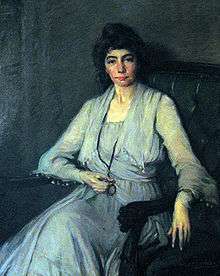
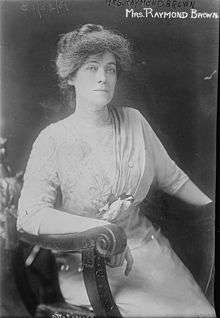
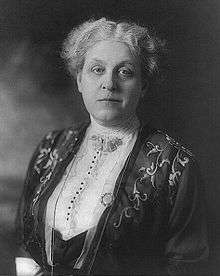
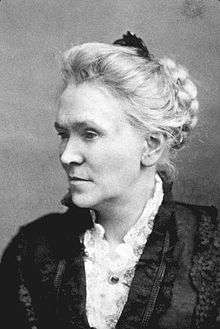
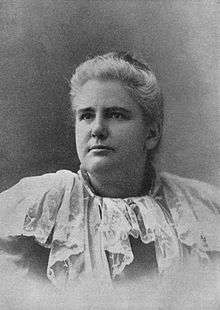

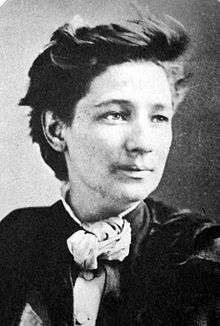

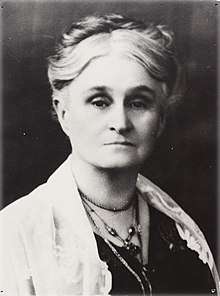
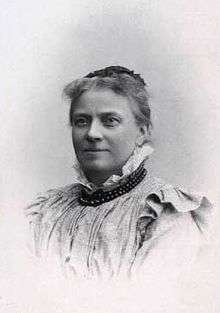
.jpg)

